Jungle Bliss in the Wayanad Wildlife Sanctuary, Kerala
I’m in the forest guesthouse of Wayanad Wildlife Sanctuary in the Wayanad district of Kerala, and I don’t want to leave here ever.
There are many things for which I want to stay.
The tranquility of the forest: the clear sky with a few clouds. The green brown yellow earth with its blanket of grass, shrubs, plants, and bushes. The spotted deer grazing around all day and night, their slender necks extended to pluck the little grass left in this summer month. The park’s captured elephants, of whom I only see two or three at a time. This one closest to me eats during the day, and at night, when I woke up and went to the outdoor bathroom, he was still eating. Now, he stands in the shade of the trees, parts of his skin yellowed in the sun. His muddied tusks are still glistening white in places. Yesterday, he was given a bath by the park mahouts. Today, he was himself taking a mud bath, throwing trunk-full of mud on his back. Turned away from me, he is wagging his tail to keep the flies away. I can look at him all day.
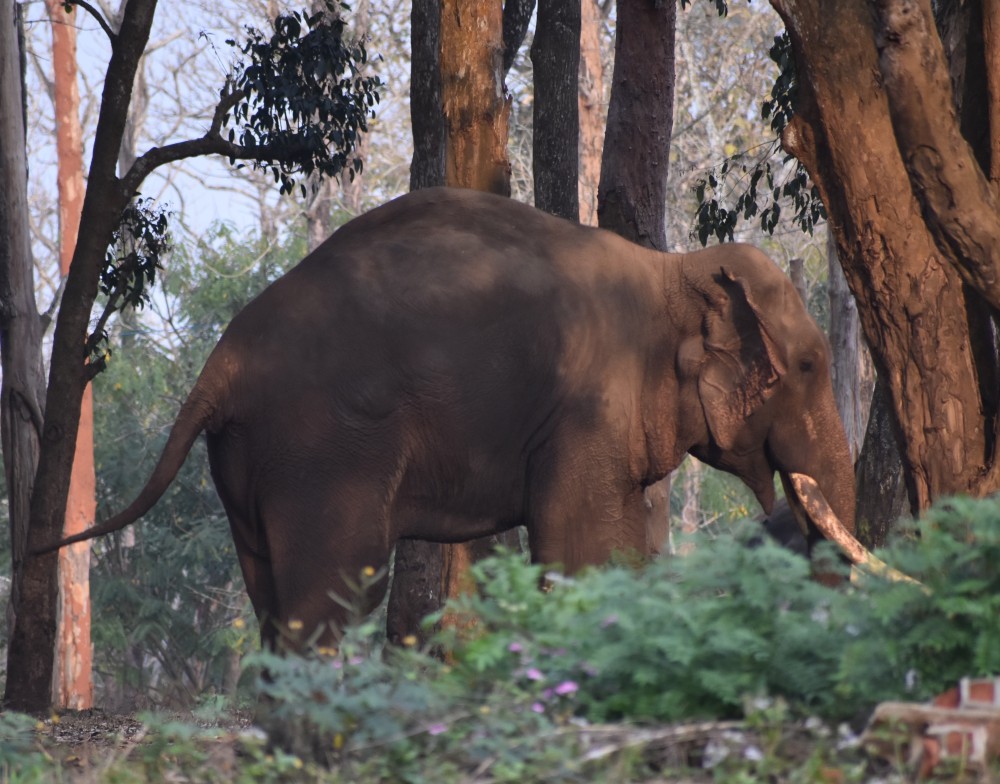
Another elephant is also close by. But this is the one I feel is a friend. Is he happy? How can he be? Here he has no family, no other elephants to play with, as he must in the wild.
Though these eleven captured elephants stay close to each other within a small area, they don’t live like families. Each is given her food. They all bathe separately. They work too. They carry logs and crush them under their foot. They are made to carry grass and food to the spot where they eat.
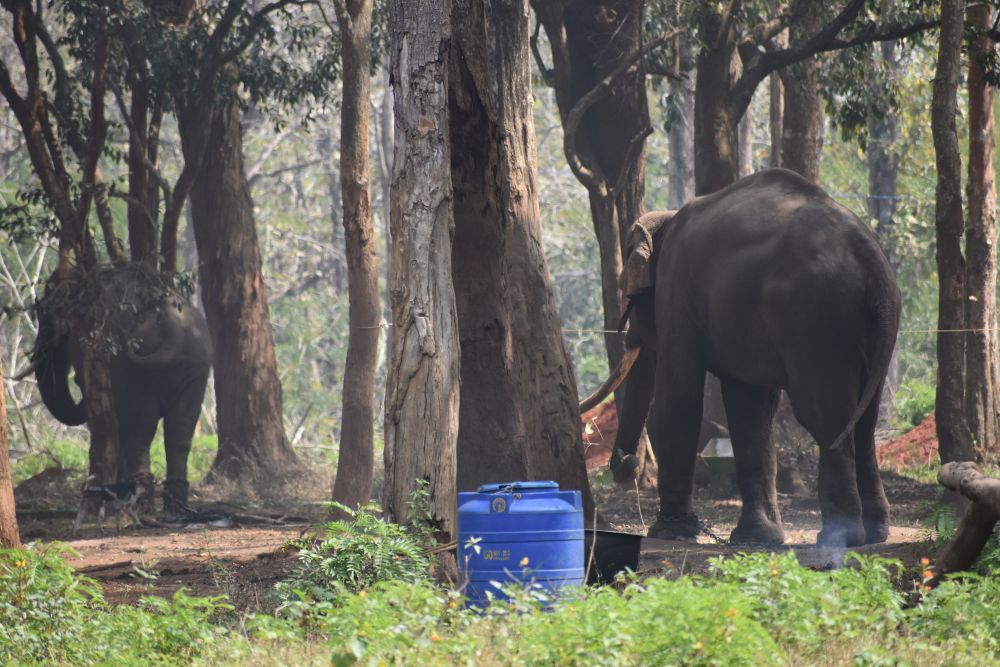
These are old elephants who were either rescued or captured when they caused trouble in the human settlements. Now the law prohibits the capturing of wild elephants. Perhaps these cannot be released into the forest. Either they won’t be able to adjust or no one is thinking about putting them back.
No matter how normal the caretaker finds living next to them or how excitedly he points them out to me, I find it odd that the animals of the wild are tied to pillar-like pegs, heavy iron chains clasping their feet.
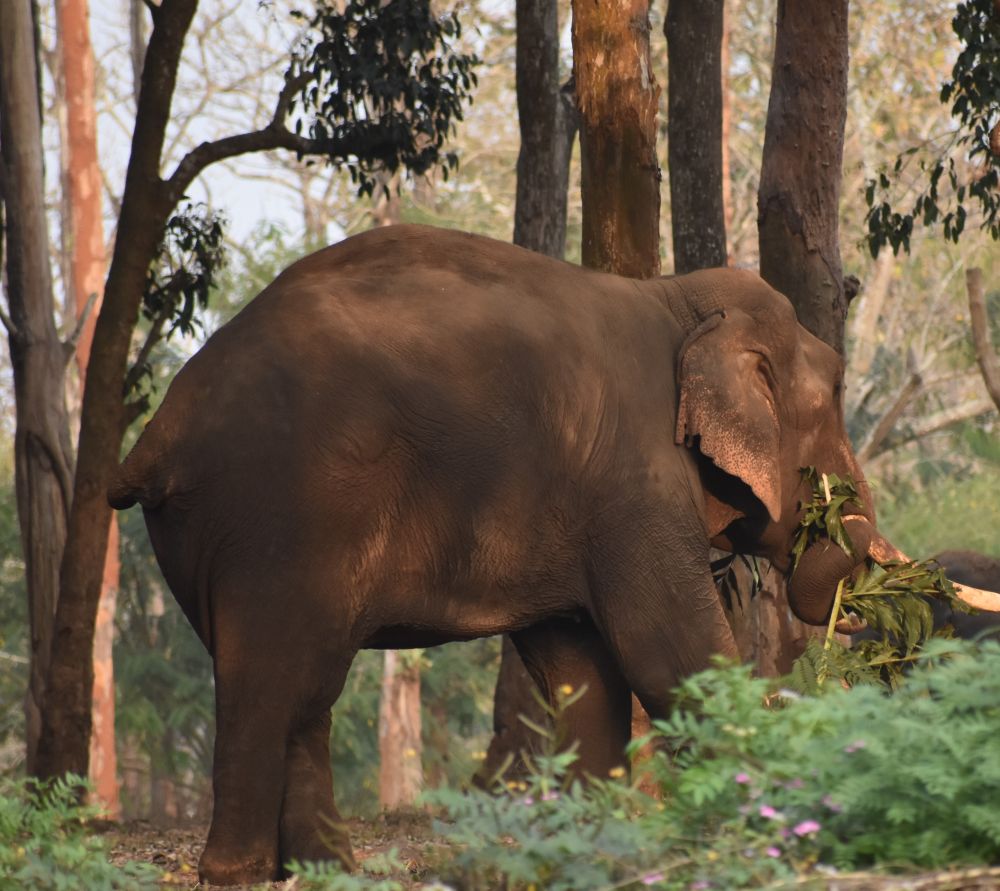
On my first day here, I was restless all night. I had gone to bed at midnight, much later than usual, and couldn’t sleep for another twenty minutes. My elephant friend was still up and kicking. He didn’t lay or sit down to rest. Don’t elephants sleep lying down? They can sleep both lying down and standing up, the Internet tells me.
I woke up at three, wanting to go to the bathroom. It’s at the backside of the room, and I had to get out. The big lights put up over the elephant camp blinded me. The elephant was still standing and stuffing grass in his mouth with his trunk, the long trees around him standing like ghosts in the white fog.
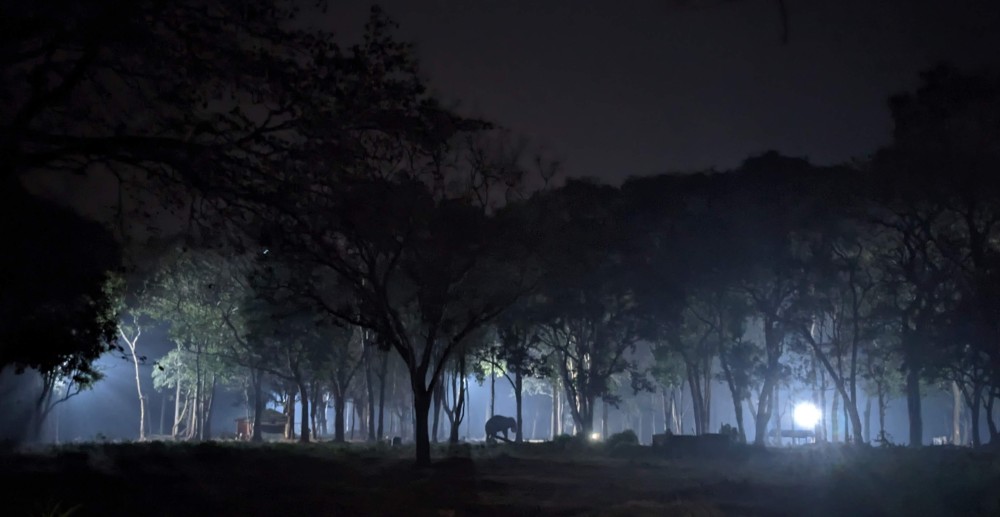
There was absolute stillness. No human, no bird, no car, no house light. The forest felt strange. The camp lights had diffused through the mist. In the foggy darkness beyond the cottage fence, blobs moved. As my eyes adjusted to the dark, they took shape and donned a darkened golden color. It was a group of deer grazing right outside our walled cabin.
The moment I had stepped down the porch and walked towards the wall, the deer had looked up from their grass, their ears taut and nose twitching. They had sensed my presence and stared at me suspiciously. As I walked towards the fence, crushing the dry grass under my feet, one deer gave an alarm call. Kho-kho-kho. Its voice echoed through the forest.
An alarm call for me. Can you imagine?
Such is the song of life here.
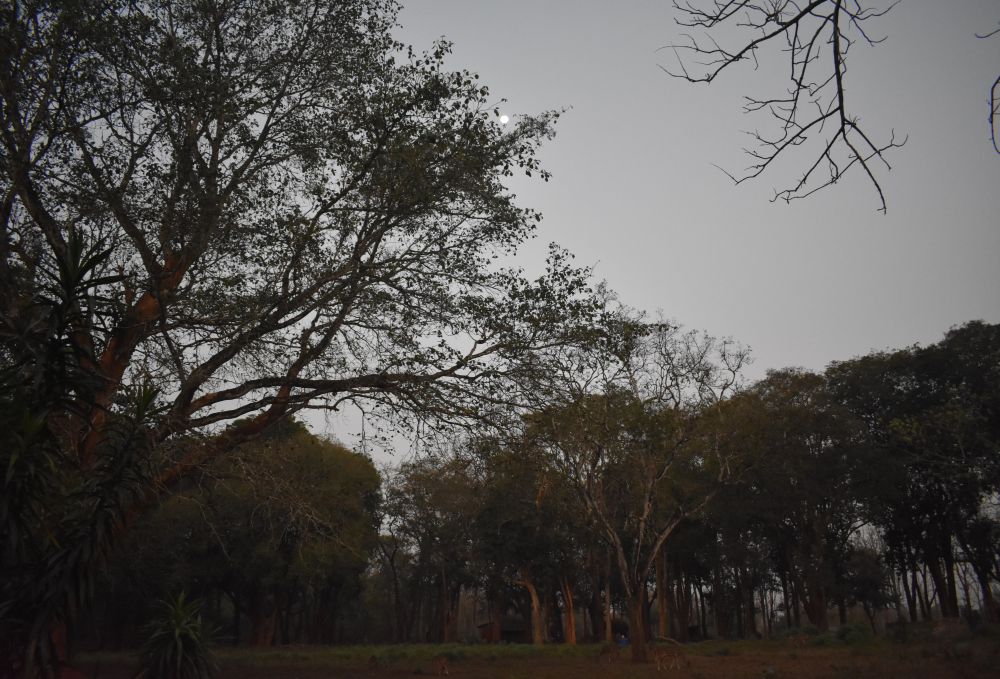
All around us is the forest.
The national parks of Wayanad, locally known as Muthanga Wildlife Sanctuary, in Kerala, Bandipur in Karnataka, and Mudumalai in Tamil Nadu are joint at their hip. To arrive here, we drove for more than one hour through the Bandipur National Park forest road. The jungle flanked us on both sides, and we passed a watering hole where a mother and baby elephant drank water. Further ahead of us is the forest with a few villages dispersed in between. Fifty feet from our cottage begins the safari trail on which buses and jeeps are taken into the Muthanga jungle by the park drivers and guides. On our right is also the forest.
We are in the middle of vast and ancient woods, and so the deep silence that rings through the air here is special. As if the whole place has been blanketed, and we are separate from the rest of the world.
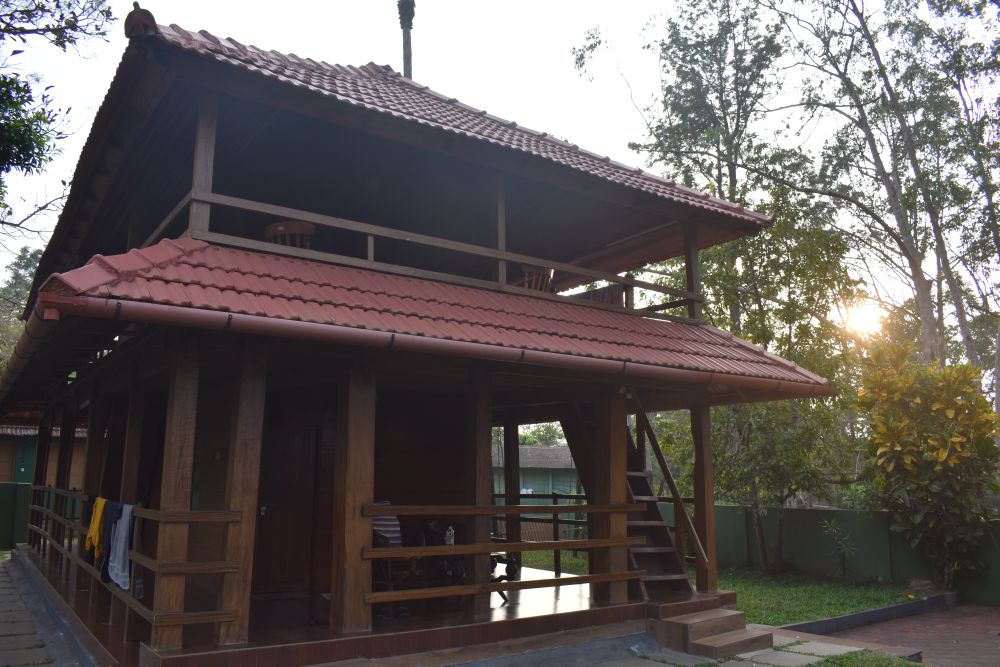
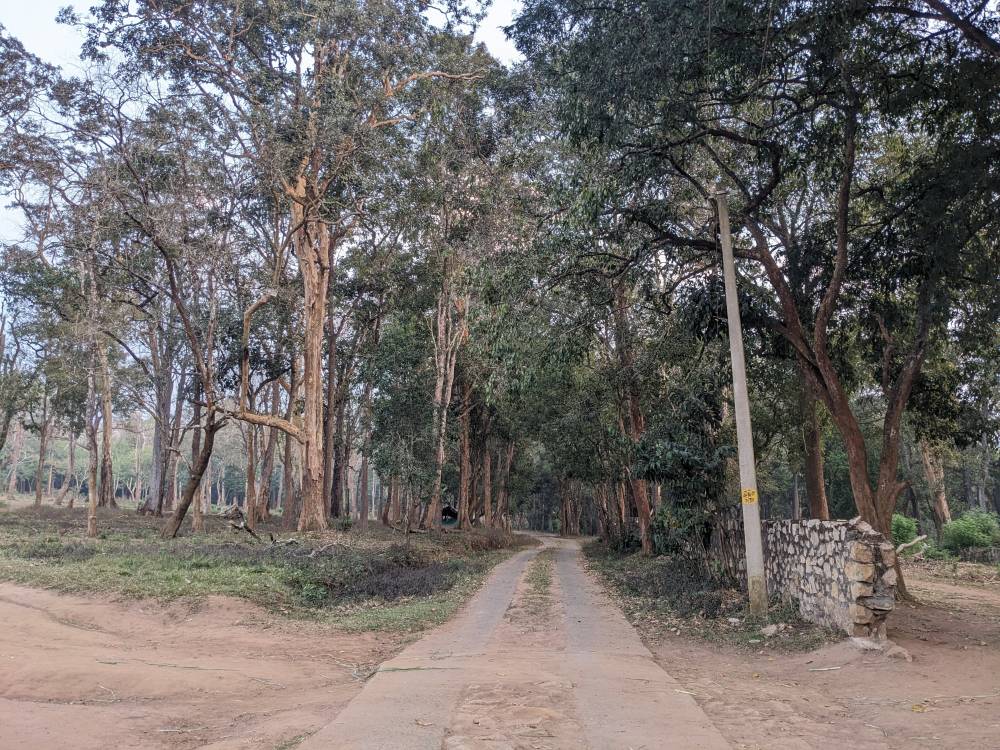
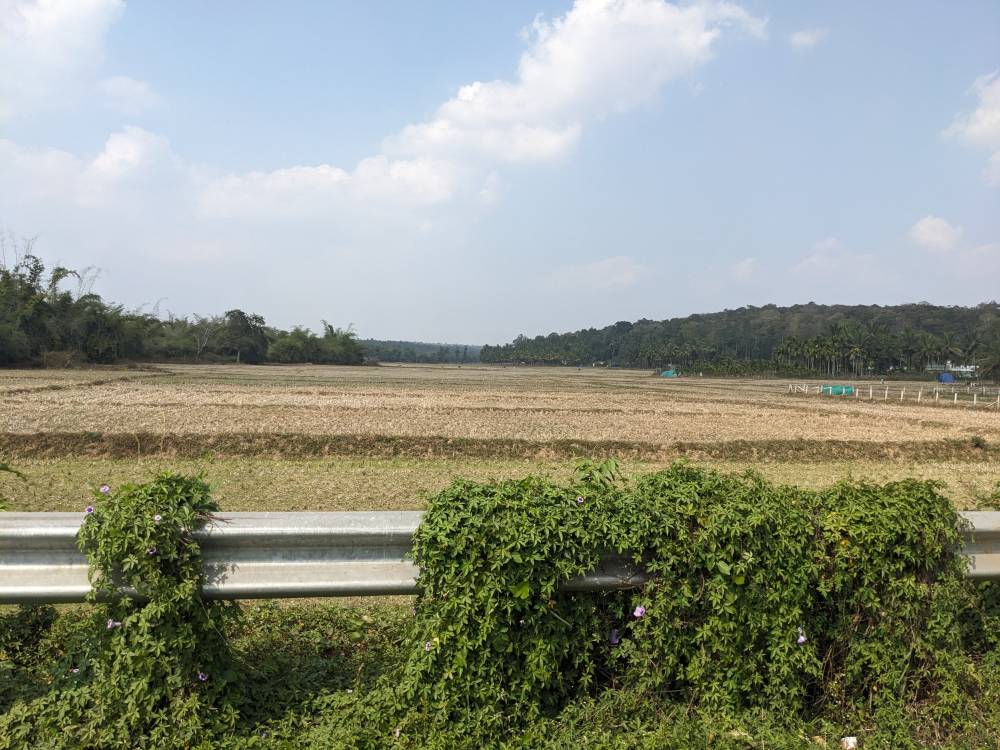
I am as happy as one can be. Why would one want to leave this place? All the time, the birds chirp. Silver langurs and monkeys chatter and gambol around each other. The elephants trumpet anytime. A different song of a bird and a caw of a crow have added to the orchestra of nature. The trees stand tall, bathed yellow in the afternoon.
Every leaf, blade of grass, tree, bark, nest, branch, and copse is trying to tell me a story. The story of their survival, of their ongoing, and of their being together. Teak, rosewood, pattal, and mango are some trees I can identify. One fruiting tree in the yard is pointed out to me as the egg fruit tree. Most, I can’t tell. Kerala vegetation is new to me. The soil smells like soil but its fragrance surprises me as it is not the one I am used to. And this elephant has become part of my life as much as one can in three days, maybe more.
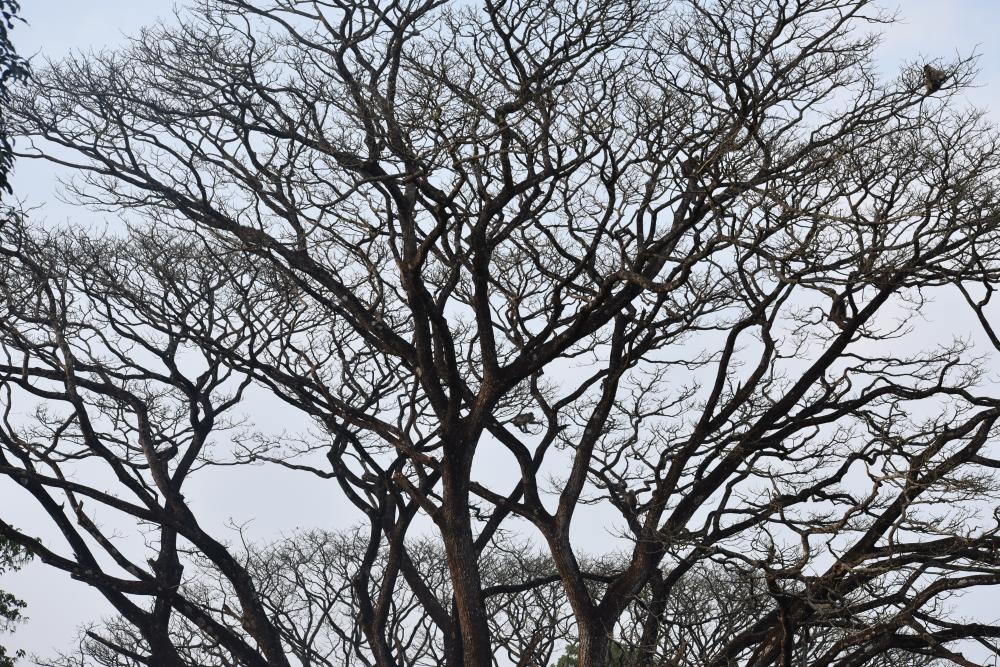
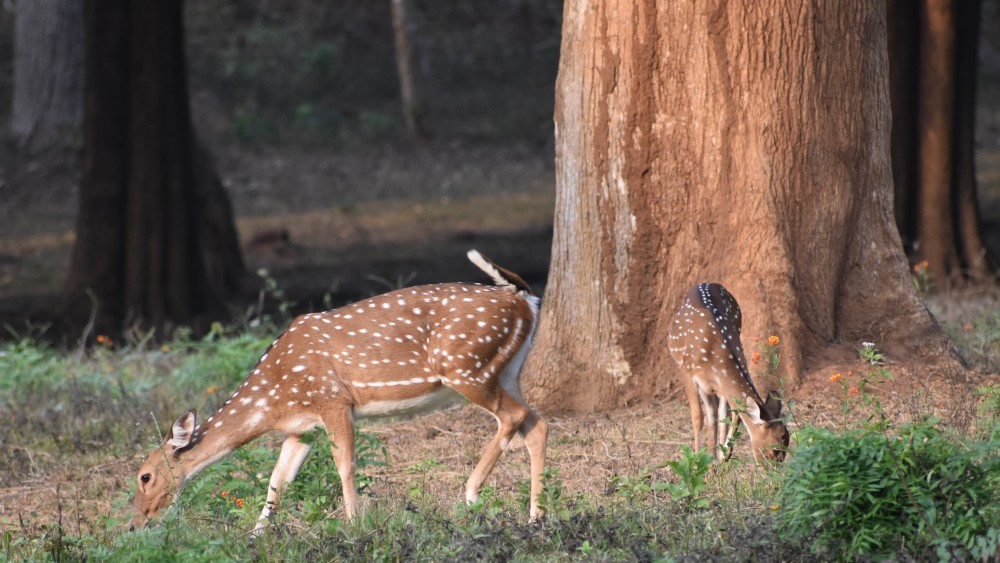
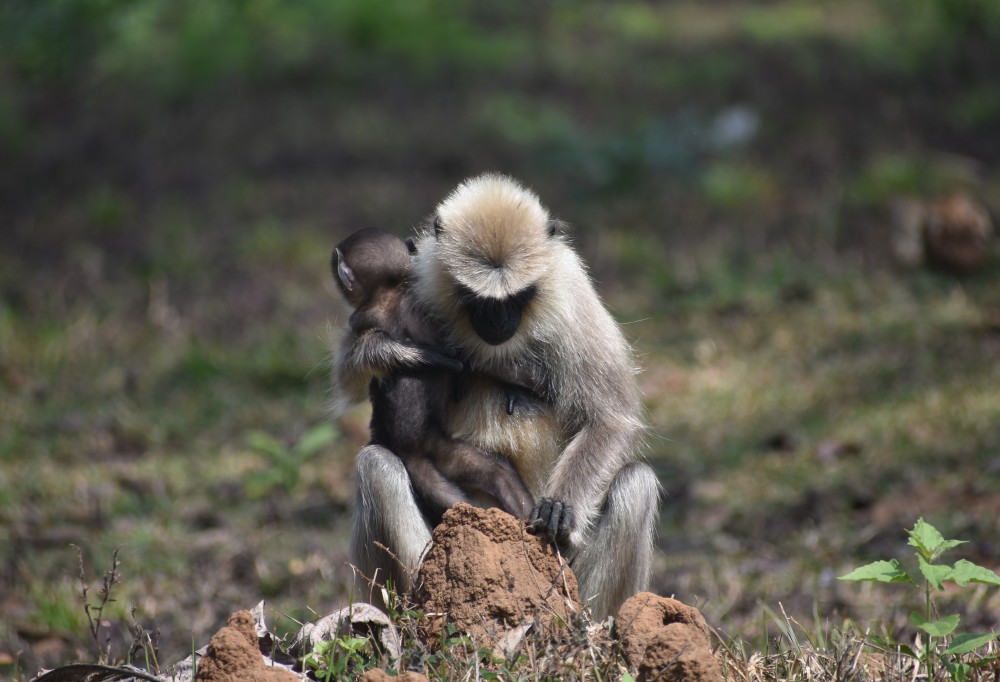
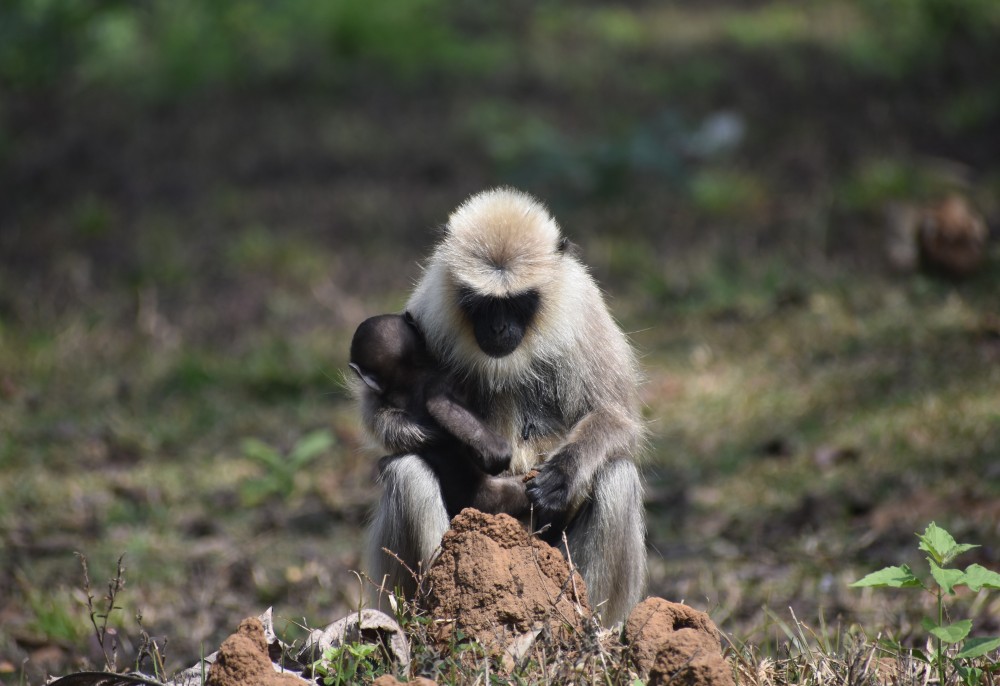
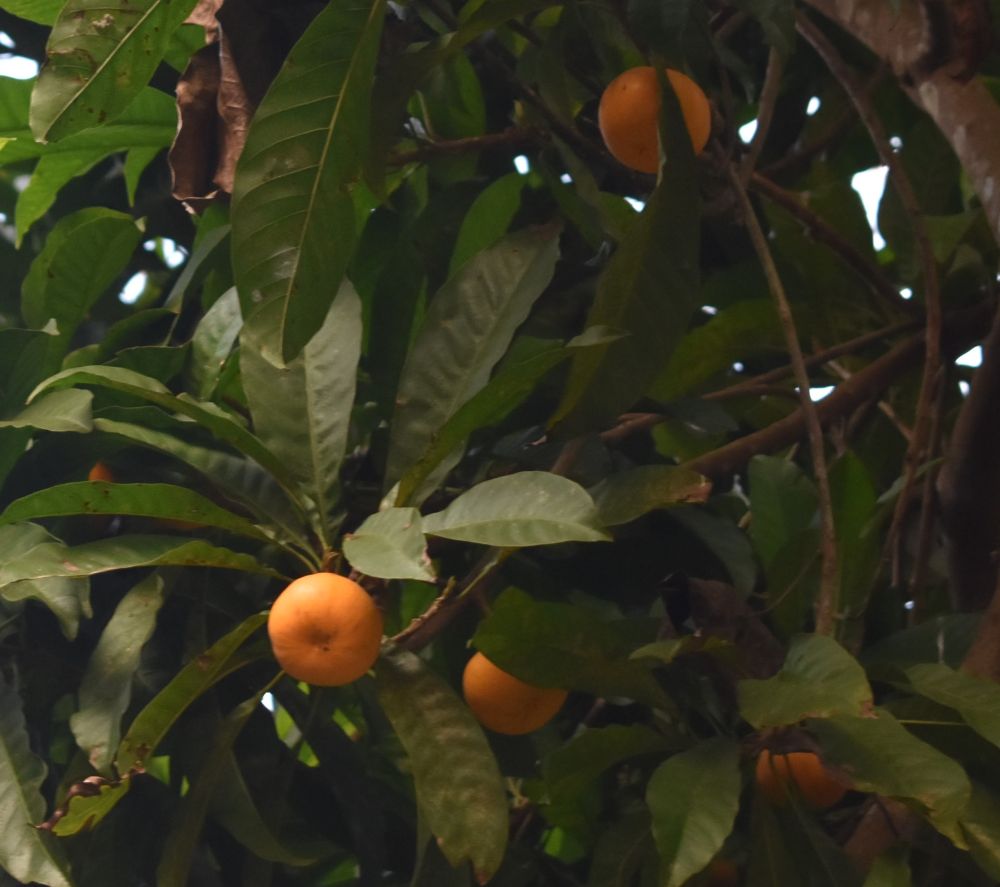
I am sad about leaving tomorrow. I wanted to stay for another day, at least. But while I was writing on the swing in the garden, the caretaker informed me the rooms had been booked by a doctor’s family from Trivandrum for the next day. The doctor, a friend of a forest officer, reserved online through the office. There was no booking for tomorrow, so the rooms were given to them.
My face had dropped. I wished that when I extended our stay for today in the morning, I had booked for tomorrow too. Another forest officer and his wife who arrived in the upstairs room yesterday were leaving a day prior. If they had stayed today—as per their original plan, we would have left.
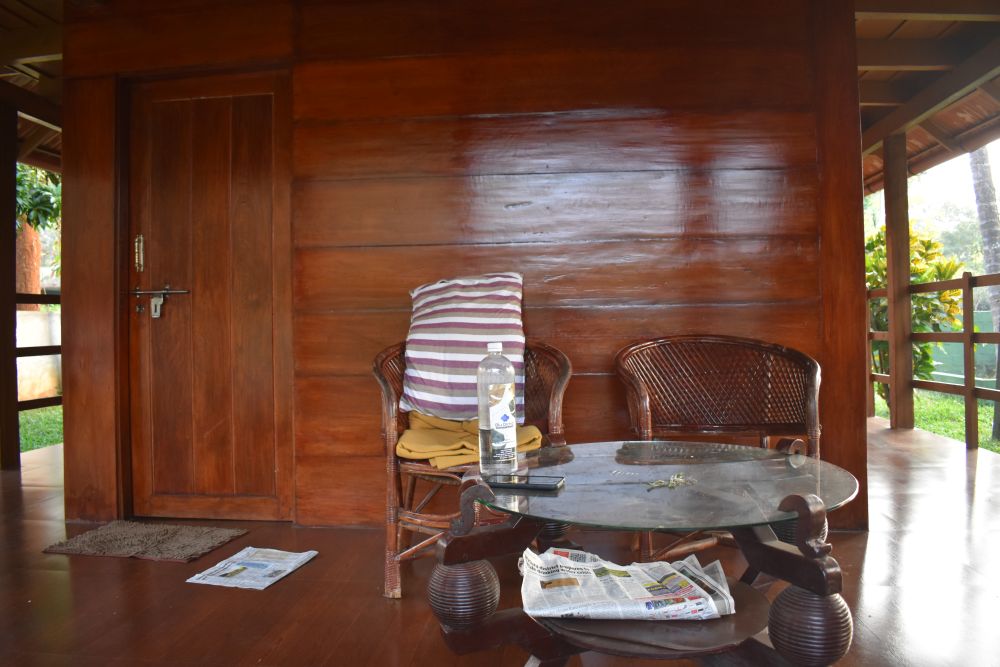
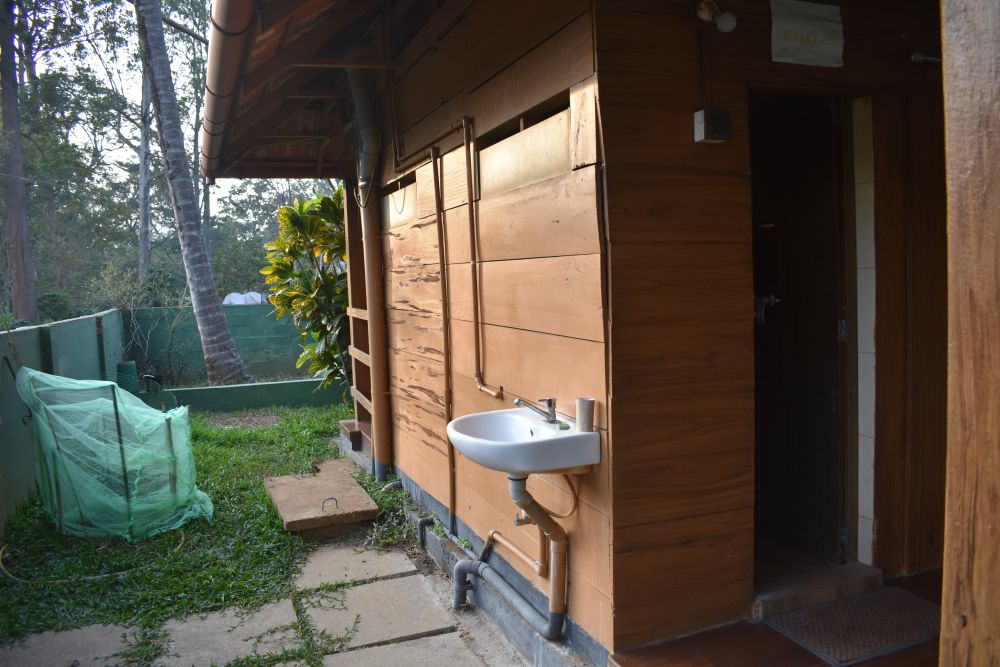
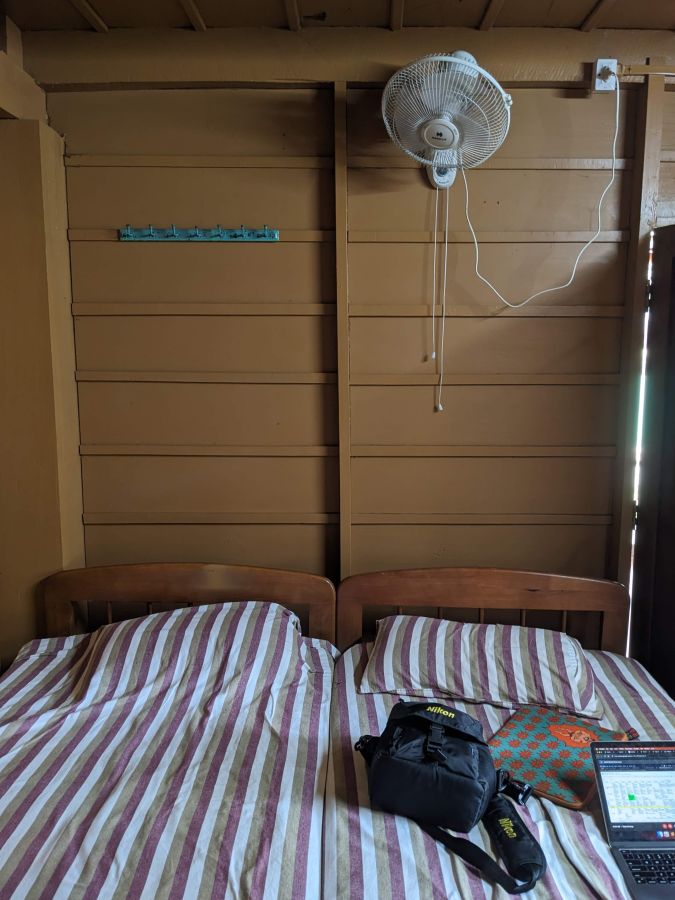
Cerambi, our guesthouse is a sylvan wooden cottage built by the British in the 1900s as a jungle rest house. It has only two rooms on two floors. Wayanad district is especially known for Serambis: the tile-roofed wooden forest rest houses built by the British. Cerambi still functions as a forest rest house of Muthanga Wildlife Sanctuary, and priority is given to government forest officials. But when we arrived here and asked at the forest office for a stay inside the sanctuary, the cabin was empty. The caretaker Rajeev showed us the wood-paneled hut, we took the downstairs room, and the officer and his wife arrived the next afternoon.
The very next moment, the cottage turned into a newsroom. The grey-haired couple continuously condemned the Ayodhya Ram temple inauguration, how bad it was for the country, and how India’s current prime minister, Modi, is making a fool out of everyone. Being surrounded by family members who believe Modi is India’s savior, I said to my partner, “It’s really good to finally come across someone from the older generation who sees through Modi’s nonsense.”
But the loud and incessant vituperation against the country’s politics and politicians fell like hot oil on our ears which were tuned into the music of the wild. Not to mention the frequent abusive words thrown in by the husband-officer who didn’t care people might be hearing him downstairs.
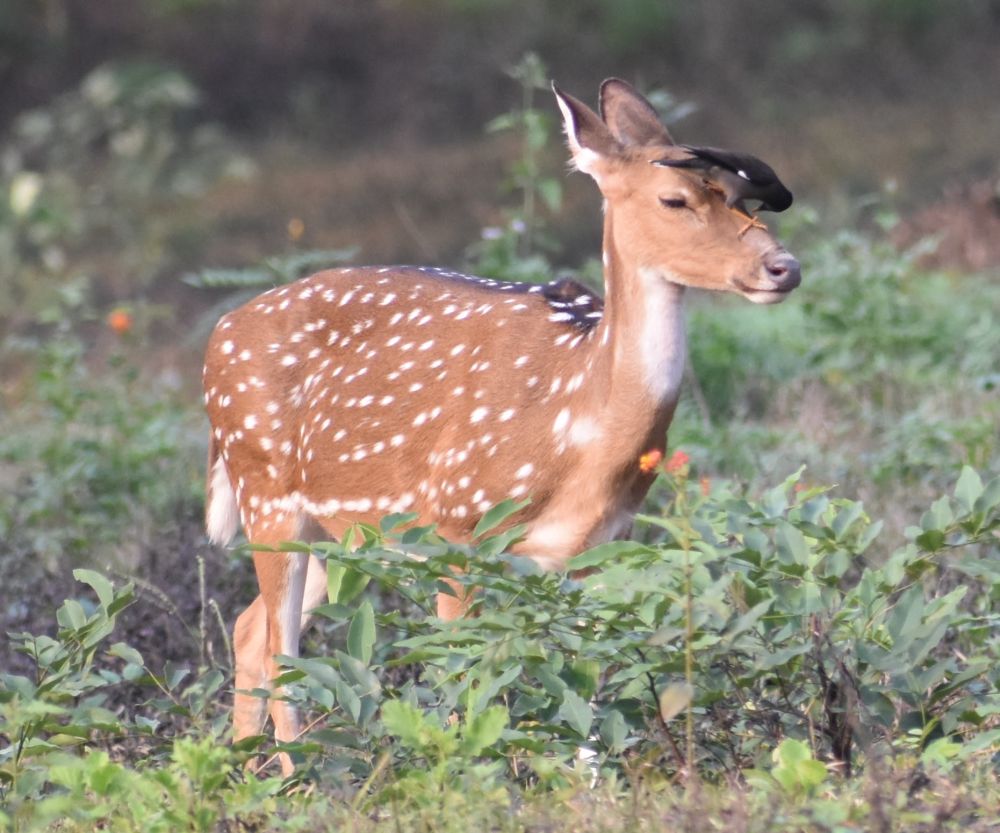
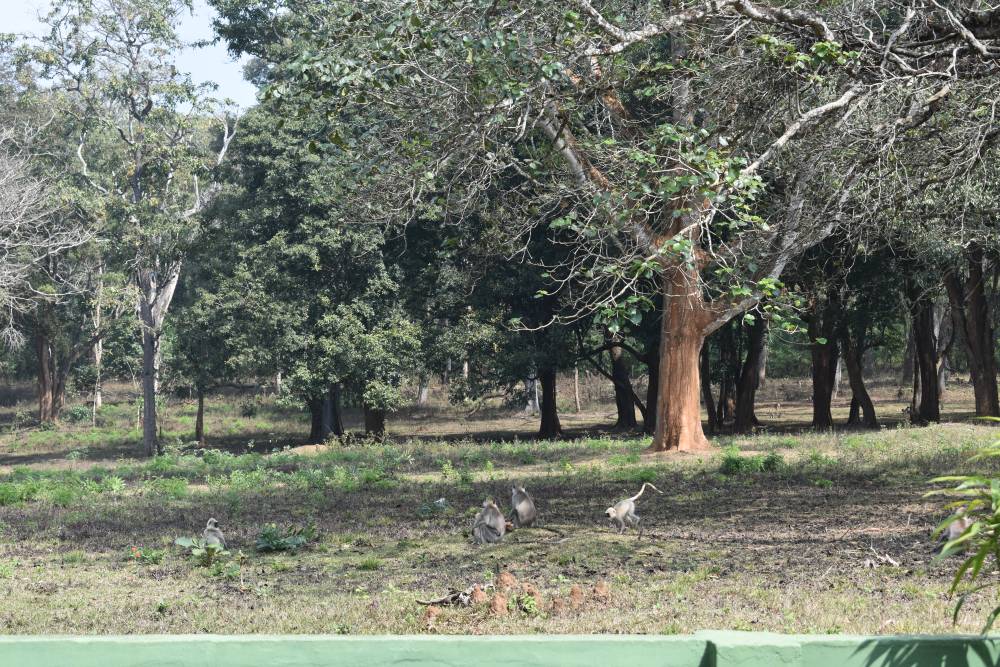
In front of me were the spotted deer, elephants, birds, langurs, and eagle, and upstairs, the couple was enraged, abusive, and noisy. The old couple pulled around chairs, letting them screech, they stomped on the wooden floor which was the only thing separating them from us, they talked on the phone on loudspeaker, they were brought water bottles and food and plates, they played music into the night and stayed up beyond us. It was classical music, but I needed to listen to the cicadas, birds, and bees.
We were downstairs, listening, writing, working, drinking, talking, eating.
After the early morning jungle safari, the officer couple told the caretaker they were leaving a day early. Seated on the swing, I called the caretaker and requested, “We would like to stay for one or two more days. We like the forest.” Next to me, my partner got emotional and said, “We like you.”
We are not supposed to say such things, even if they are true. Over the three years on the road, we have learned that such over-enthusiasm and honesty don’t go well for us. But the words of praise slipped his tongue, and now we couldn’t do anything.
“We would stay for two days. But if someone comes could you please let us know? It becomes noisy,” I told the caretaker Rajeev without thinking.
He smiled just so slightly. He knew we were mentioning his officer guests. “Sure. I’ll check with the office.”
Later, he told us he had reserved the ground floor room for us for one day.
“We should stay tomorrow, too, and leave on Thursday,” I said to my partner five minutes after requesting a day’s extension.
“Even if someone comes, we should stay,” he replied.
While the caretaker cleaned the room and the porch, I was in half a mind to tell him to book for us for another day too. But I was a bit shy. I’ve just extended; I’ll ask later.
Now I was sad the place was unavailable. I should have been smarter. Everything gets booked.
“Don’t worry, things will work out in our favor. This must be better for us. It always is,” My partner said.
Whatever happens, happens for the best—this we have been shown by the universe innumerable times. We had reached Muthanga by a matter of chance too.
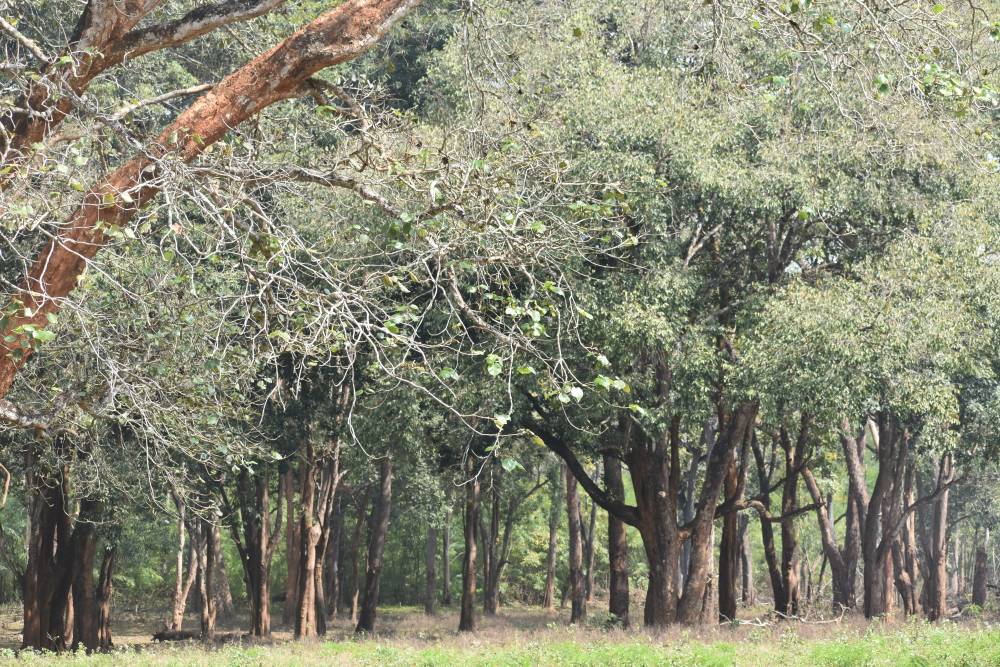
That day, our hotel in Mysore was sold out and couldn’t accommodate us. We were forced to pack up and get onto the road. Once out, we drove on to Wayanad, beginning our journey into Kerala. Mysore to Wayanad is a straight but curvy forest road, and the first stop for any traveler is Muthanga Wildlife Sanctuary.
“I don’t think the forest rest house would be available. Even if it’s, it won’t be clean.” We both agreed. But the cerambi room shown to us was clean even if the bathroom was not. As we were the only ones there, the wooden hut was going to be ours for at least one night. I wanted to put up for two days. Upon our insistence, the caretaker Rajeev whom we called Anna, called his office and confirmed that only the upper room was booked by an officer for the next day.
That was how this sylvan accommodation became ours for two nights. Today morning the two nights had passed.
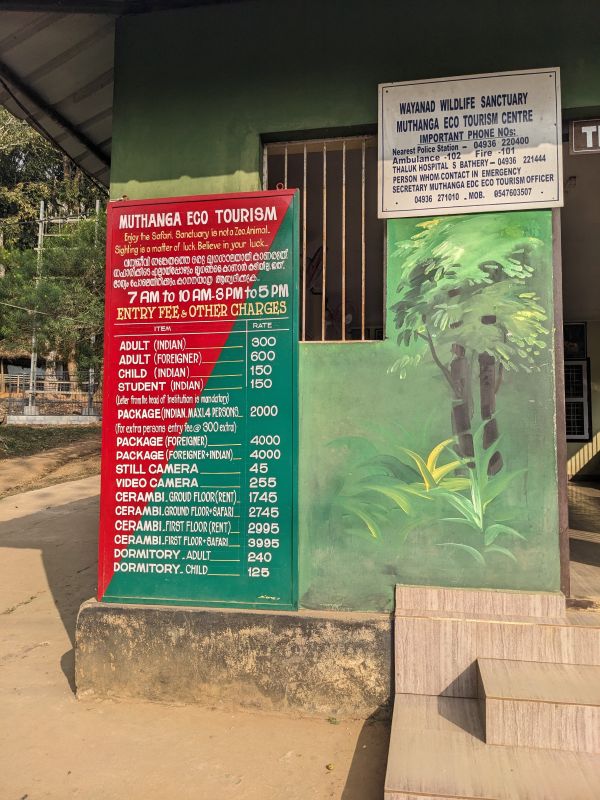
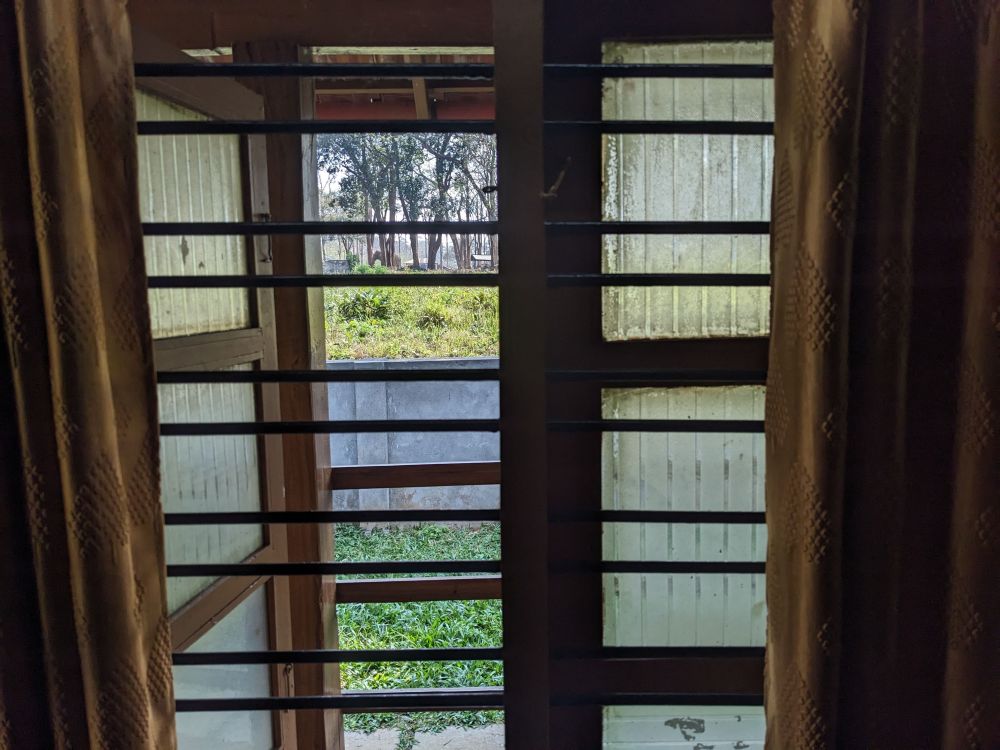
The two days here couldn’t have been better. The first morning we went for the jungle safari at 6:40 am.
The road for the safari goes from right behind our cottage. We were in the jungle within two minutes of sitting in the forest jeep. The natural wild forest soon turned into a eucalyptus plantation, as pointed out by the driver. Before the forest was declared a sanctuary in 1973, the plantation had been put in by the government. Paper was made out of the eucalyptus trees. Now the ashy-white orange trees stood tall, the shadows within them starting to be dissolved by the rising sun. The leaf-strewn stone-paved narrow road winding through the eucalyptus made for a perfect photograph.
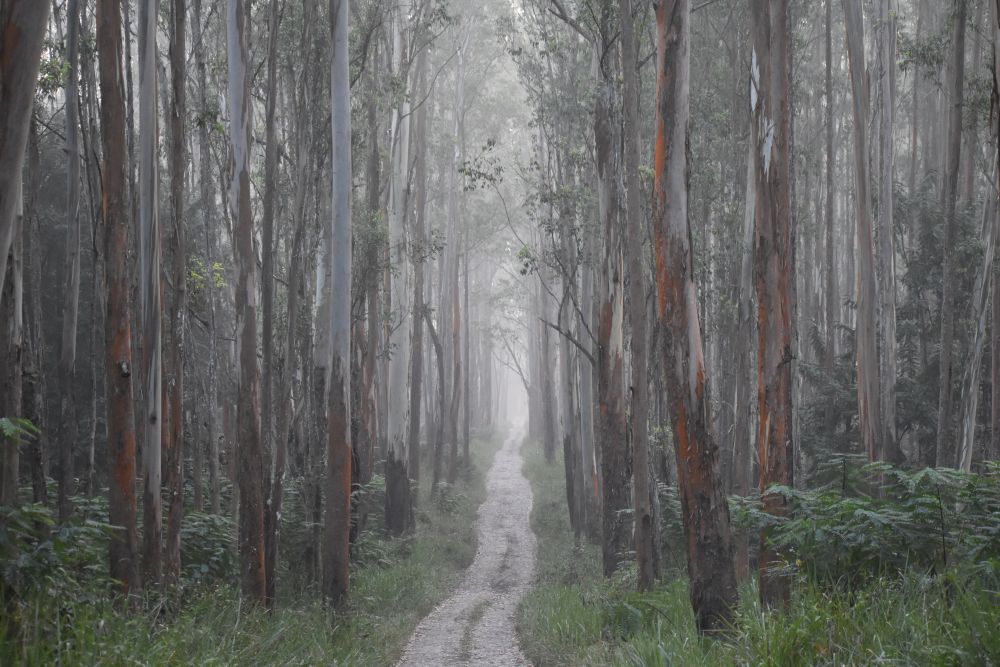
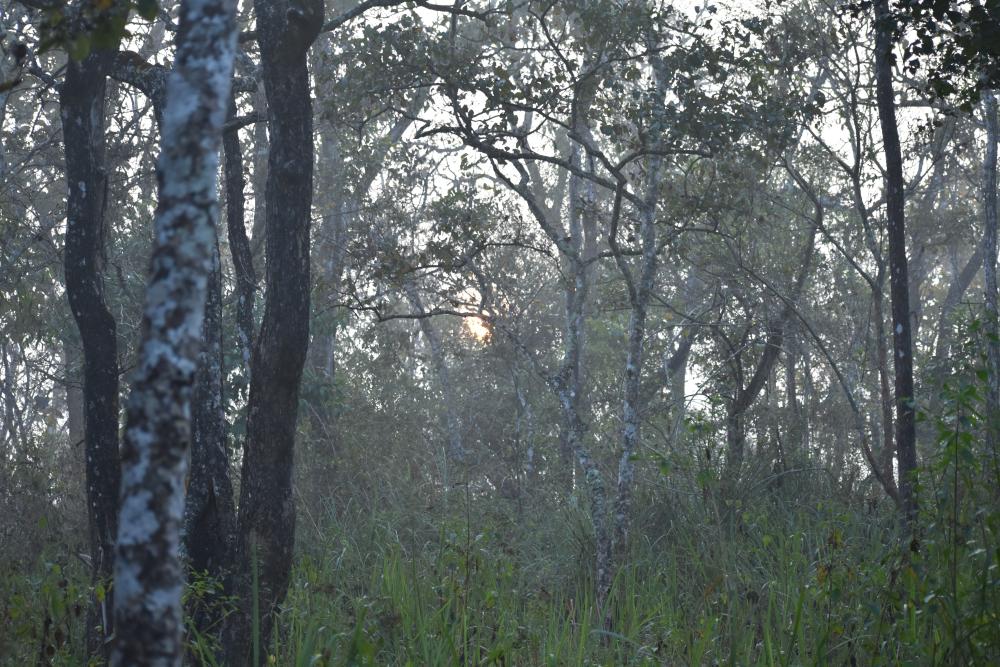
That morning we saw a Malabar squirrel, a bison, and many deer. Mostly, we were just driving on the forest-fringed road without stopping while looking for wild animals. The guide had been pointing out to trees naming them as ukarich, sunna or sanna tree. Now I can’t find any of them on Google. Maybe I’m spelling them wrong.
One road was shown to us as going to Mudumalai Tiger Reserve in Tamil Nadu (TN). Another driver on today’s safari—we took two safaris—said the road to TN is bad. “It’s off road. When forest workers have to go in for some work, two to three cars go together. If a lone vehicle gets stuck, they won’t be able to take it out.”
Another road was pointed out to us as the tri-junction point of Tamil Nadu, Karnataka, and Kerala. The three forests: Bandipur, Mudumalai, and Wayanad meet there.
Towards the end of the first safari, wild dogs—locally known as dhol—were running about on the roadside. Despite our various forest ventures in BR Hills, Kali Wildlife Sanctuary, Dandeli forest, Bhadra, and so on, this was the first time we saw wild dogs. I had carried my Nikon but had forgotten its memory card (all my travel resources and equipments). I pointed my phone camera at the pack of four wild dogs who were running amok on the road, taking breaks by sitting down in the scraggy, dry grass. They were alert, possibly out hunting, and looked cute with their golden brown fur, bushy black tails, and foxy ears. As we drove further on, they continued running in the direction from where we had come.
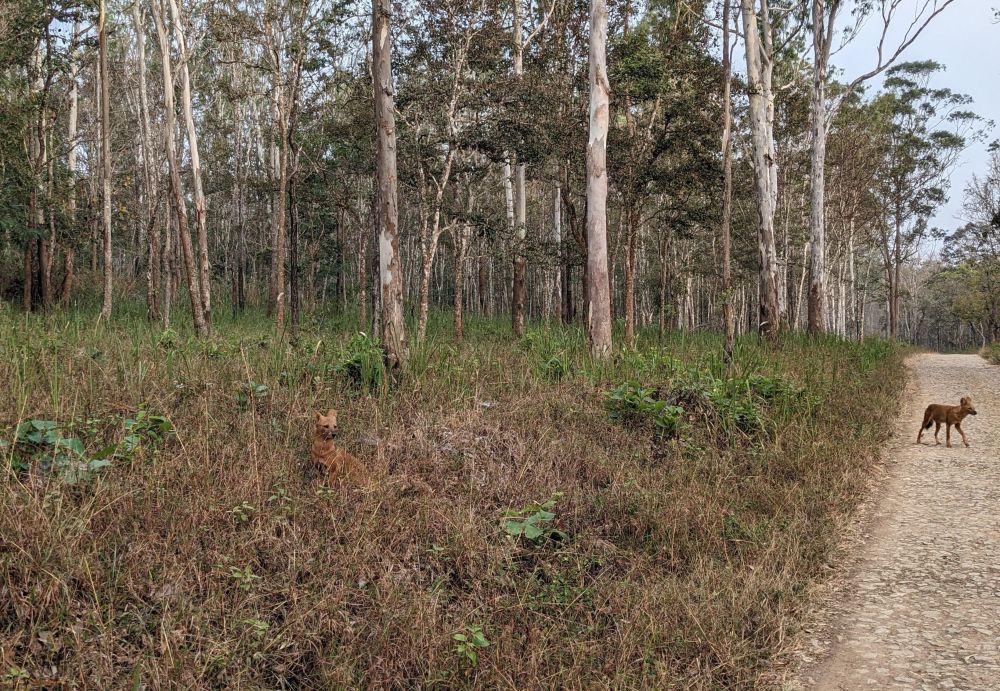
“Finally we see dhols,” my partner and I exclaimed to each other. Now we had seen them, and they were real for us.
After the safari, we had morning tea at the tea and snack stall outside our sanctuary. The old friendly guy at the kiosk—where we drank all our morning and evening teas—poured tea from a tumbler into the glasses from such height that a waterfall would be ashamed. The snacks displayed in the glass cabinet intrigued us. Though I asked the name of all, I can’t remember any now. But I can vouch for the banana bhajji: long slices of sweet ripe banana dipped in dough and deep-fried.
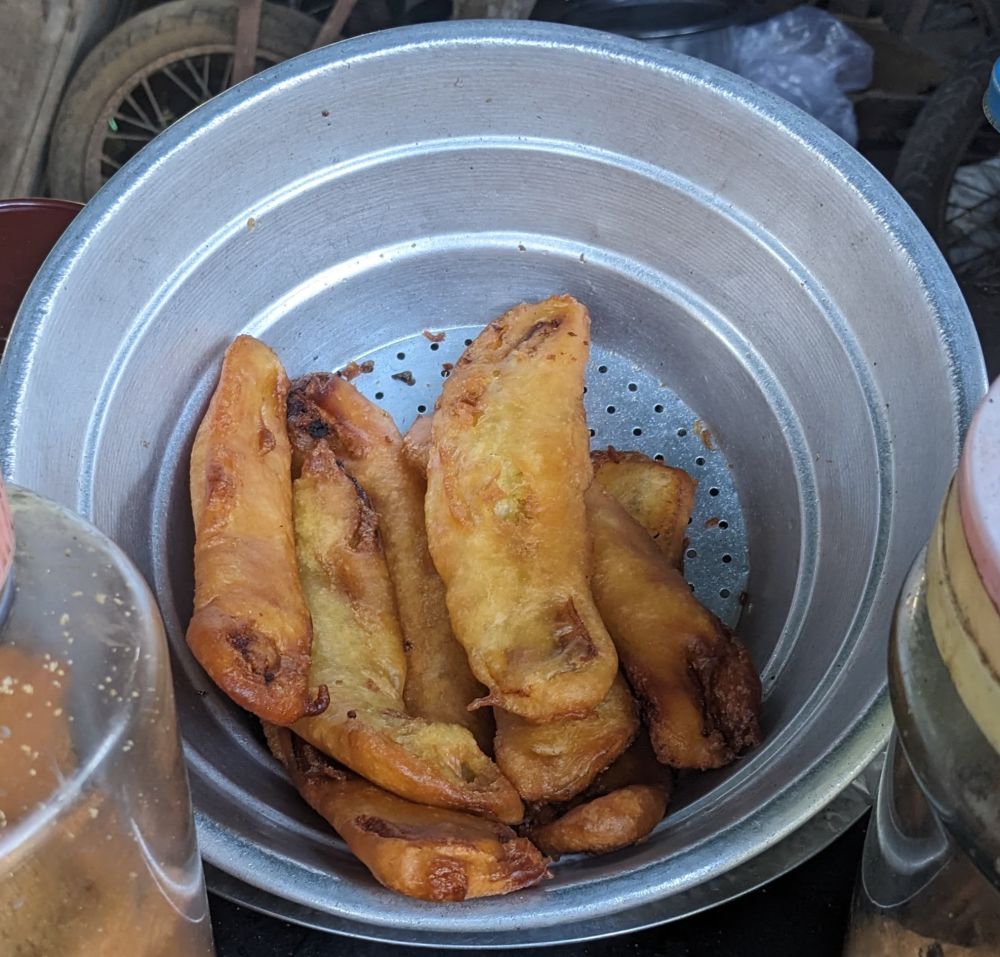
I wrote all day on the porch while my partner worked in the room, as he likes. In between, we drove to lunch. We were not allowed to walk on the forest road. There were small eateries on both sides of the dusty, dry road, none looking promising from the outside, as is the case in places that are nowhere. Neither we were in a town nor a village.
We treaded into a little family-run shack and were invited to sit. We said yes to vegetarian meals, our first of many in Kerala. Soon banana leaves were put in front of us, and hot pink water, infused with the kokum fruit, was poured into our glasses. The little shop was managed by a husband and wife, and after serving us sambhar, rice, vegetables, lime pickle, and papadum, the wife brought a plate of golden fried fish for our inspection.
“Fish fry?” She asked.
Before we could answer, she had put one on both our leaves.
The lunch cost us two thirty rupees. The meal was seventy, the fish sixty, or vice-versa. Mixed with rice and sambhar, the fried fish tasted good, so good I could get used to it.
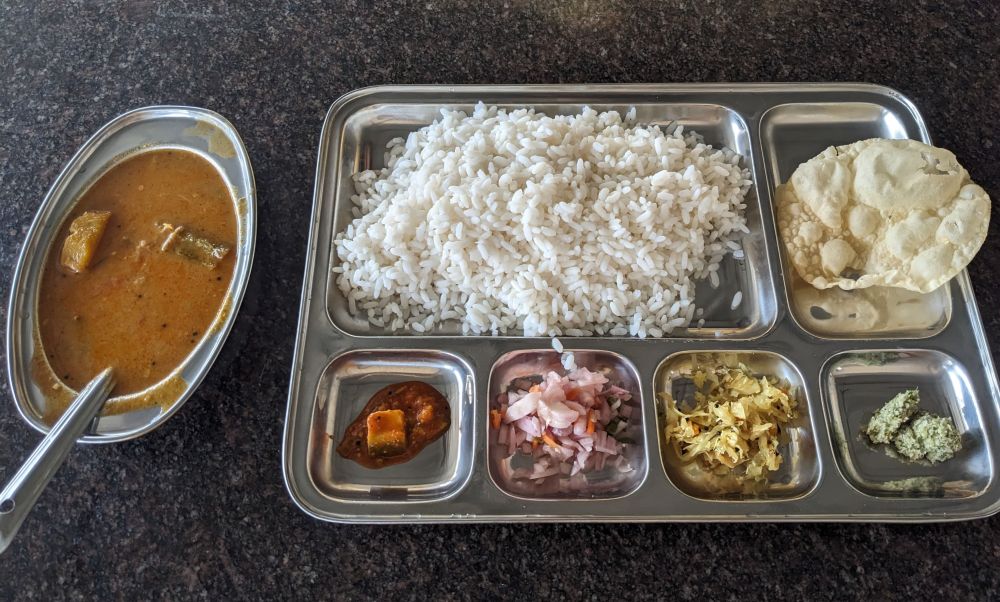
In the evening, I walked around the cottage within the fence and on the path that leads up to the safari road. We can’t go beyond that.
The evening is magical here. The spotted deer come out of the foliage and onto the open ground around the rest house. They dodge the forest workers to get to the elephants’ feed. Groups of langurs come out, shining in the setting sun, the mothers picking the termites from the mud mounds while their young ones cling to them. The safaris stop so no cars or people go in and out of the forest. Birds chirp louder than the rest of the day.
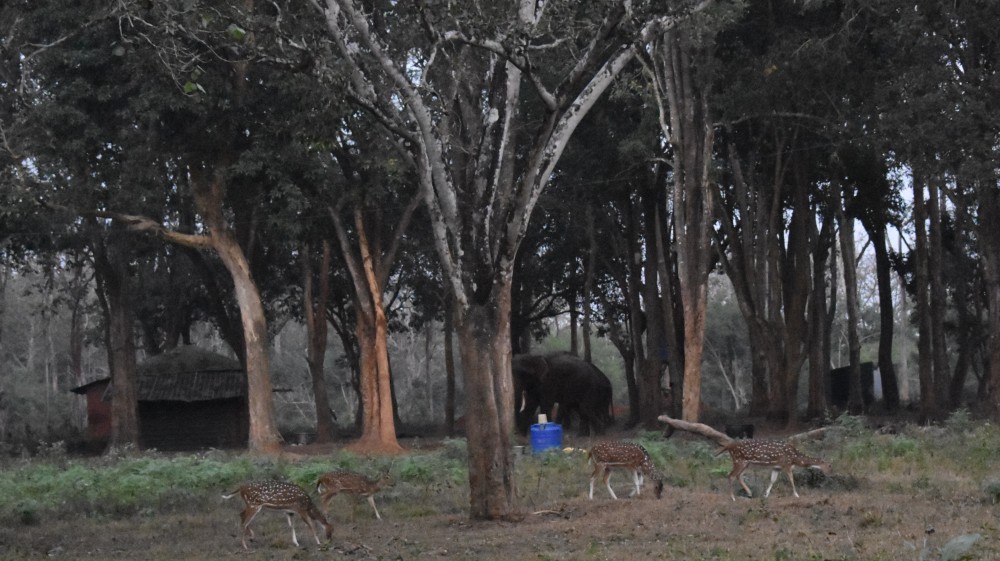
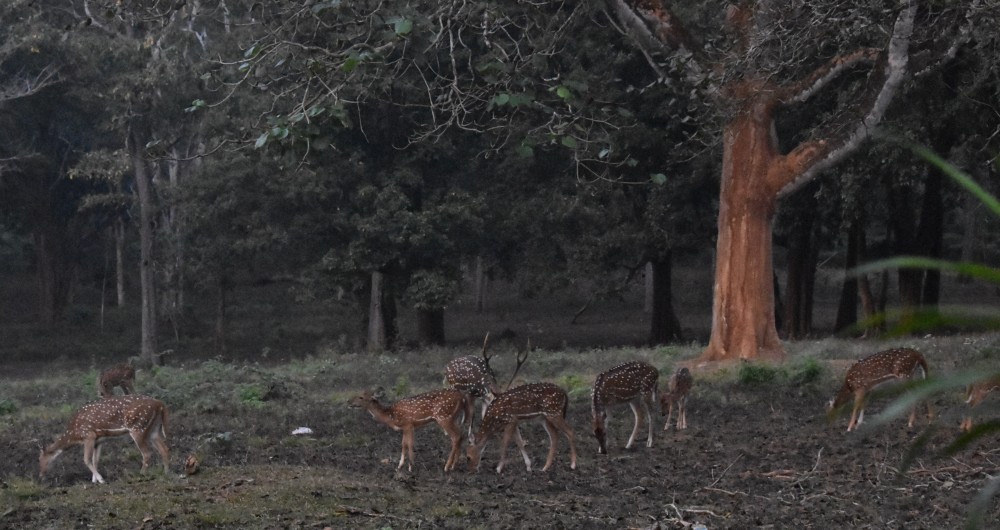
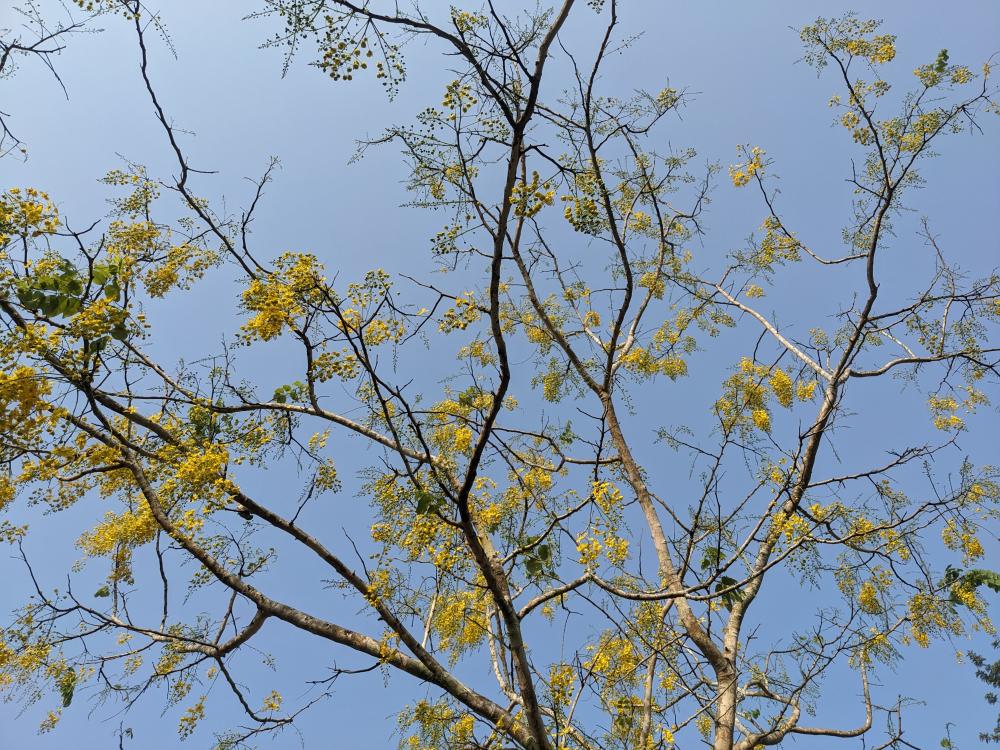
After the sunset, I packed my laptop and took out our plastic boxes, knives, and fruits. On the coffee table on the porch, I cut watermelon: we bought four and have eaten three. Then I chopped tomatoes and onions and added them to roasted chickpeas we had bought from a Rajasthan vendor at a local fair in Goa. Though I had tasted the chickpeas while buying, I had missed the chilli. Even a single chickpea could burn my mouth. But mixed with tomato, onion, and lemon they tasted so good we finished a whole box of them and then made some more.
Of course, we were having the chickpeas with whiskey. We finally opened the bottle of Amrut whiskey we had in our suitcase. I bought it in Goa weeks ago and have been carrying it since. While getting out of Goa and entering Karnataka, I boldly lied at the police checkpoint.
“Do you have liquor?” The policeman asked, eyeing our backseat laden with fat backpacks, shoulder bags, and other packs.
“No. Just home stuff.”
“Not even one bottle?” He repeated, clearly surprised.
“No. We can buy everything in Karnataka.” After many checkpoints in many states, I make sure to not even carry empty wine bottles. They make the police suspicious, who then take out the bottle, open it, and sniff to see if we are lying.
As we carry our home in our car, I often tell at police posts that we are from the North and have been traveling the South and thus the many bags. The policemen touched and felt the suitcase and other bags. The whiskey was so deeply hidden in the suitcase that even I couldn’t find it when I tried fishing it out. My partner could neither. We had to get the suitcase out of the car and open it to get the bottle.
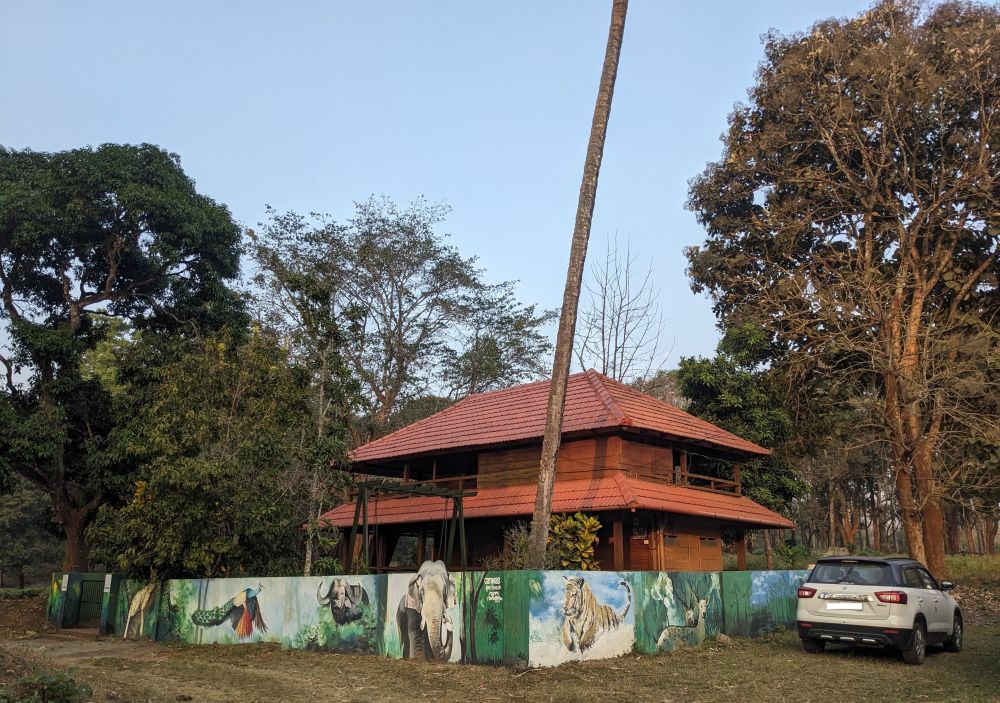
We drank and ate on the porch, the forest silent around us. The stars were out, and the deer and the elephants were still eating. Both my partner and I stalked the cat who crossed our yard to see if it was the leopard cat found in the Muthanga Wildlife Sanctuary. It probably wasn’t. I think it was the one who had made a home in a rusted car parked close to our guesthouse and which is now moved from here by the forest guards to another place nearby where other cars abducted in ivory smuggling are left to rot.
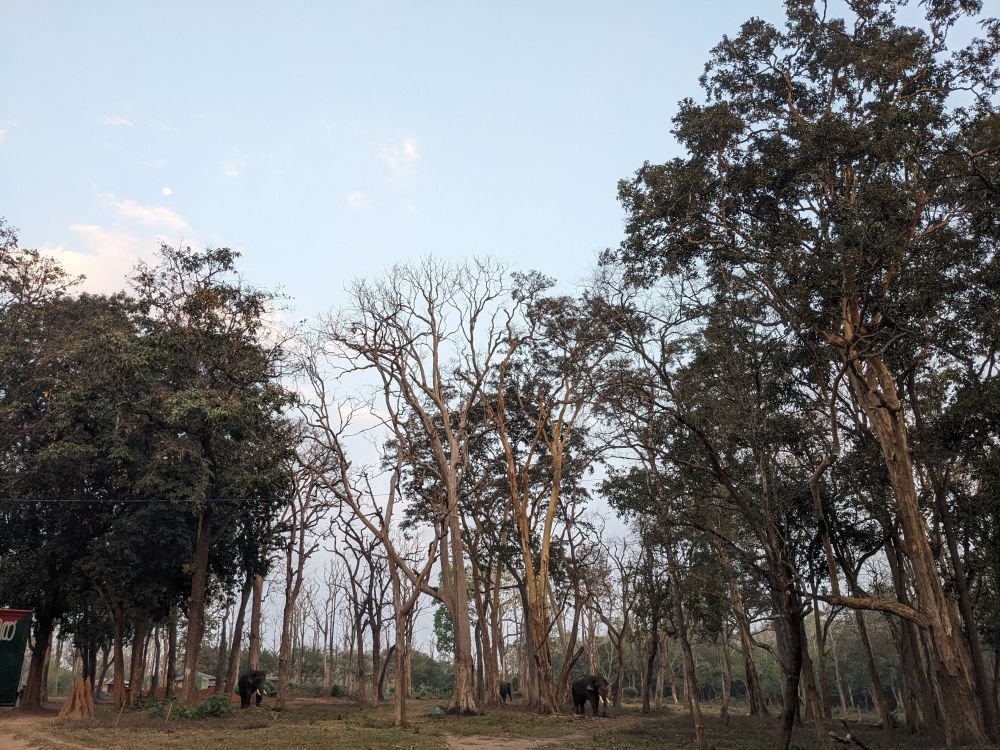
My partner and I walked on the dewy grass, peering from above the fence, squinting to see the wildlife around us. We sat on the swing in the garden—glasses in hand and the bowl of chickpeas between us—and discussed what all would we see in the state. So delightful was the forest, that we felt we would miss out by sleeping early. We went to bed at midnight.
Last night, our venture ended early though. We didn’t have tomatoes and onions. Our chickpeas weren’t as tasty. The couple upstairs played videos and music, and we were both done with one glass of whiskey each. We went to bed early to find the solitude we so treasure.
Today, we can do whatever we like. We are alone in the cabin. Tomorrow, we leave.
The elephants are right in front of me. Though I am worried for them in more than one way—are they eating well, do they miss their families, are they resting well, should they not be left to sleep in the dark—I enjoy watching them being bathed and fed, playing with mud, eating, and so on.
I don’t want to go. I’m dreading leaving this place.
I have gotten used to this quiet. I crave it. In a so-called civilised life, a human as sensitive as me can perhaps only find absolute peace in nature. The natural world is gentle, after all, always minding its own business, and I can trust it. Lulled by the silence and tranquility, I can let go, without having to worry about dealing with any human being.
Then, of course, seeing the earth live and breathe every moment from so up close is a privilege.
As if there was a void in me that is filled by the deer going about their daily life, these elephants shaking their ears and tails, the solemn acts of the elephant keepers who occupy themselves all day with taking care of these pachyderms, and everyone else around here whose job is to care for the sanctuary, guard it, and so on. This is not the usual world of money, jobs, business, schools, shops, construction, traffic, malls, and tiny gardens in the narrow streets we know. This—right here—is magic.
Today, we can do whatever we like.
“I made a mistake by not booking the room. If I’d booked, we could have stayed for one more day. He has even cleaned the place, and it’ll be good for another day,” I say to my partner as I put a piece of watermelon sprinkled with black salt in my mouth and swing my legs dangling below me on the garden swing.
“Could you stop thinking about that? We did our best. Things will work out,” he replies, digging into the bowl of chickpeas mixed with chopped tomato and sprinkled with lemon. There was so much chill and salt in the chickpeas we didn’t have to add any more.
We walk around on the grass like the first night, drinking and talking under the almost full moon. The fog is already enwrapping the world around us, and the big lights around the elephant camp are on. The whiskey bottle is soon finished. We brush and floss and are in bed by 10:15. In the cool breeze coming through the open window, I fall asleep soon enough. The room is dark. I had covered the magic lamp which diffuses light throughout the night with a black cloth and a black towel. Outside light has been blocked by the mist.
I sleep like a baby and other than a dream, I don’t remember anything from the night. The alarm shakes me up at 5:40 am. The world is sleeping under a blanket of thick fog; today is more misty than the previous dawns. It is colder, too. Not even a single human is around. Not even an insect stirs. Only deer and elephants move, grazing, munching. In the white fog, they are also just shapes. Even my partner isn’t snoring, as he usually does. Only a rooster is crowing.
Absolute stillness of the wild, as may have been at the beginning of the world or of one’s life. How quiet can it be!
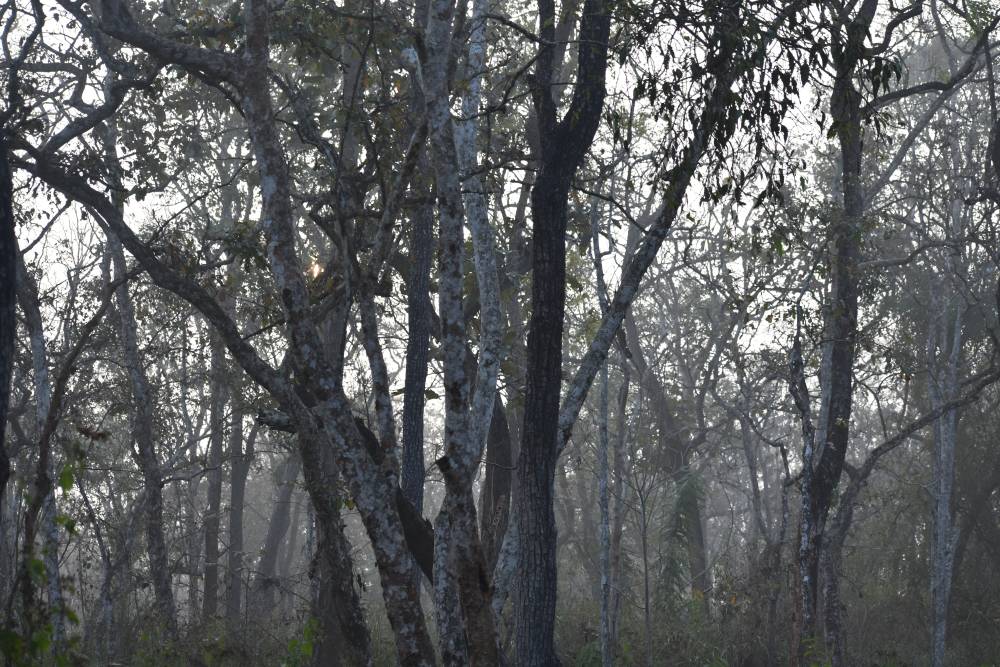
Now is the time for safari, and my partner and I get ready.
On the ride, we cross many spotted deer. Chunks of fresh elephant dung—some big and some small—dot the path every few hundred meters. The guide cum driver even points out a little pile. “It’s of a baby.” Then he stops at the edge of a low-lying land.
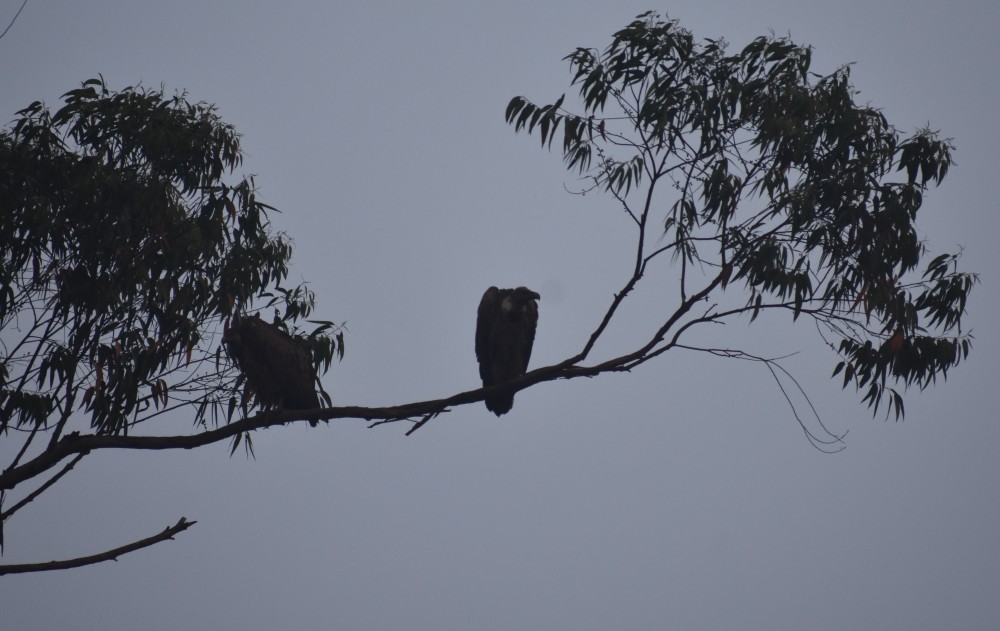
“Vultures,” he points out to our right. “The animals killed in accidents are thrown here.” This driver speaks in Hindi, unlike the first one with whom we only conversed in limited words and frequent giggles. “See, there’s the antelope of a male spotted deer.”
I look hard. A grey-brown vulture with a white neck and black beak sits on the semi-dry grass, eating something. Probably the carcass of the deer. Another flies to the top of a tree. There is one more on another branch.
“Now they’re here but later we can’t see them. We don’t know where they go.” The guide drives on.
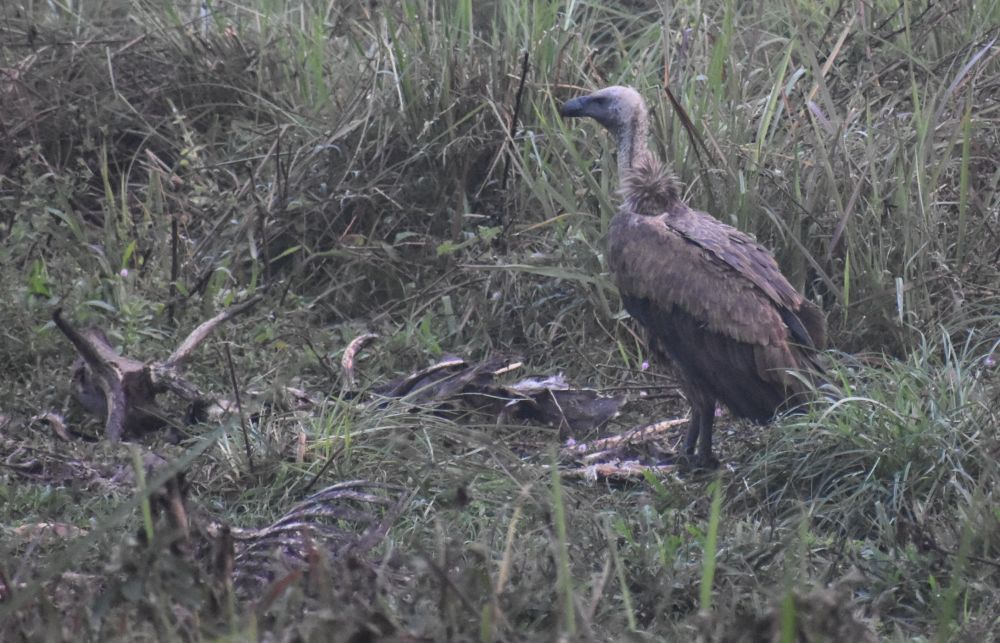
It is surreal to see wild vultures, whose population has been ever-decreasing. Where do the vultures go after they eat? Why is the forest guide who spends so much time in the jungle so perplexed by them? I don’t have the answers.
As we drive on, another big pile of fresh elephant dung lies ahead of us. The driver says, “Dung is everywhere but where is the elephant?” We laugh.
As my eyes catch a langur climbing higher up a tree, the driver presses the accelerator. A branch cracks. He pushes down the brake pedal and turns his neck around. The driver hadn’t seen the langur.
“Langur,” I say and wait for the information to sink in.
He is quiet and perhaps smiling.
“Did you think it was an elephant?”
“Yes.” He is quick to admit. We laugh again.
Finally, we exit the jungle road and get onto the main tar road to get back to the sanctuary. This is the same road on which we had driven from Mysore to Wayanad.
“It’s an old road. It’s called Bangalore Calicut highway. There’re two ways to get to Wayanad from Bangalore: but this is the better road.” He summarises.
When I visited Wayanad in 2014 or 2015, did I take this road or some other road? If I was on this road, I’d have remembered.
Back then, I didn’t take any safari, hadn’t read about the Muthanga Wildlife Reserve, and didn’t even stop at its gate. I have no reason to remember this road or this sanctuary which has been our home for three days. Also, my friend in whose car I traveled drove, and he isn’t known to drive slowly through the forest.
Further ahead, some cars are stopped on the road.
“Elephant.” The driver slows down.
“Elephant,” my partner chirps.
“There are many,” the guide points out ahead of us.
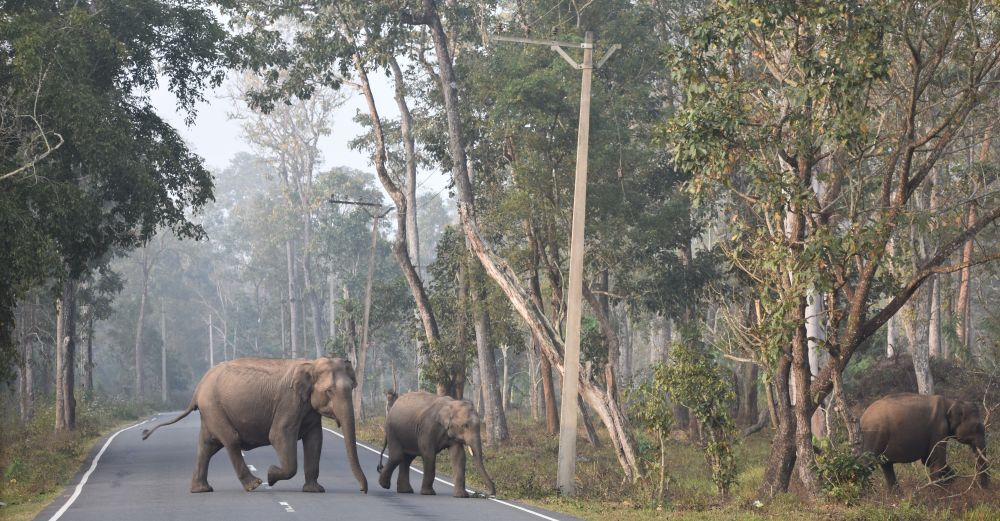
I didn’t see them. But now, a big elephant is disappearing into the jumble of bushes and plants on our right. Another big one is ahead of us, crossing the road. More are there on our far left. Elephants seem to be common sighting here on this road. The driver is relaxed.
Aware the elephants would cross the road, I say to the driver who is crawling further, “Please stop. They’ll cross.” Ahead of us and behind, cars and trucks are stopped. Some honk, perhaps hoping the elephants would let them go sooner.
The mother and a baby elephant approach the road and scamper across it. Behind them are trucks and cars, and the mother trumpets, running faster into the foliage on our right leading into the forest. Perhaps she is warning us to stay away from her family or perhaps prodding her child to go on quickly. Do elephants scold their children like humans? My partner and I clasp each other’s hands. A mother and baby elephant dancing into the forest make a beautiful sight.
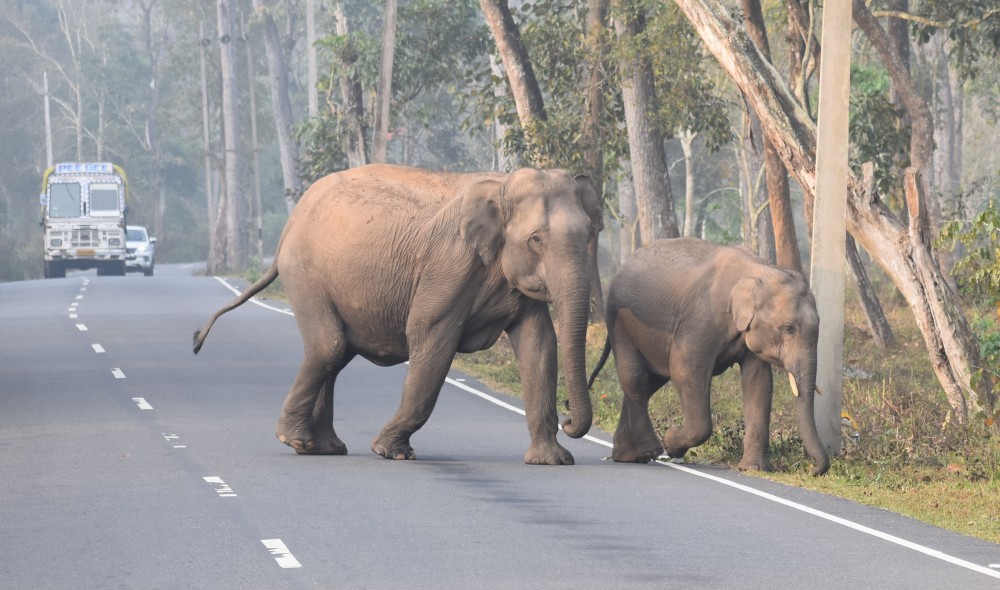
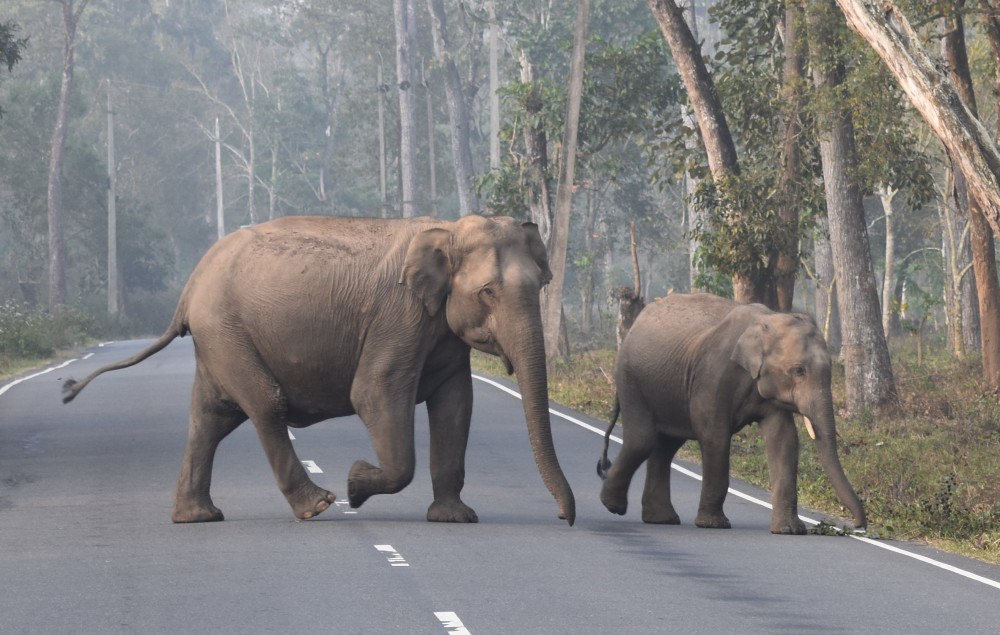
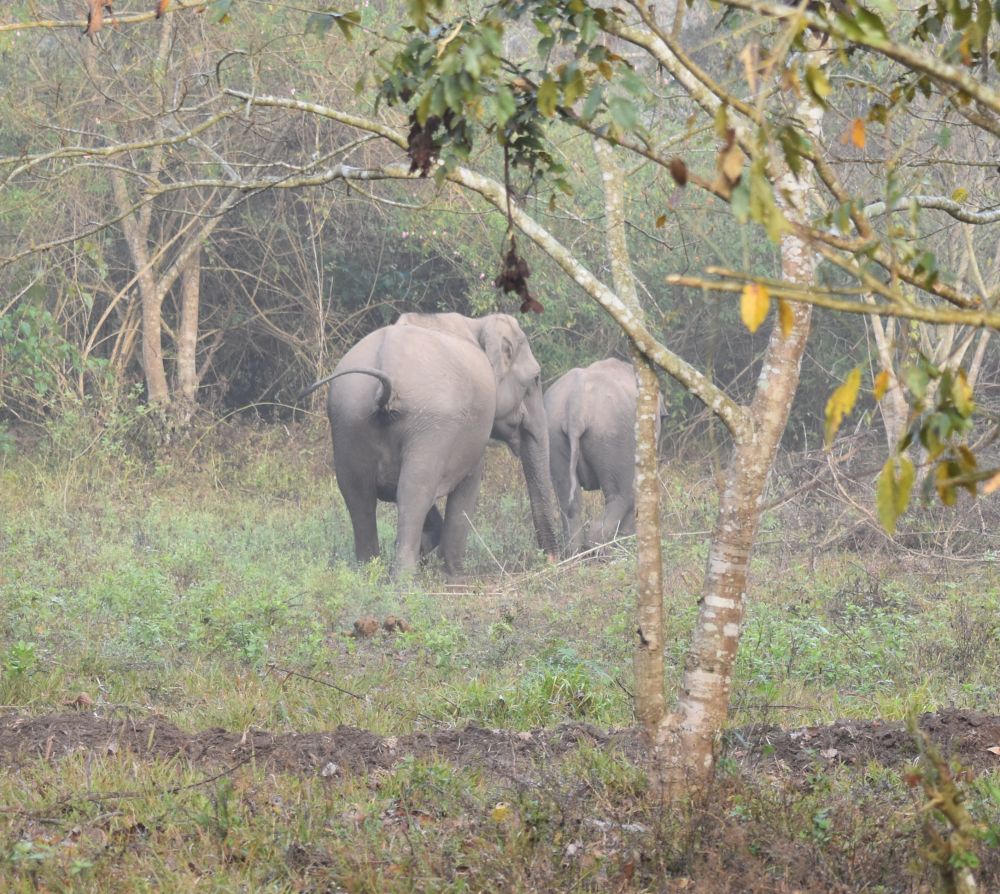
Pictures don’t do justice to the event. Though I was busy taking photographs for the first two seconds of their crossing, then I just watched the mother-baby duo.
What a timing! Five minutes later, we would have missed the group. We would have come home to tell the caretaker we had seen elephant dung and leopard pug marks only.
In the camp, two elephants were put on two trucks barricaded by logs and were being taken away.
“There’s a festival in a temple.” The caretaker told me. In my seven-week travel in the Kerala state, I would see enough elephant transfers to know that whenever and wherever there’s a festival, elephants are brought in.
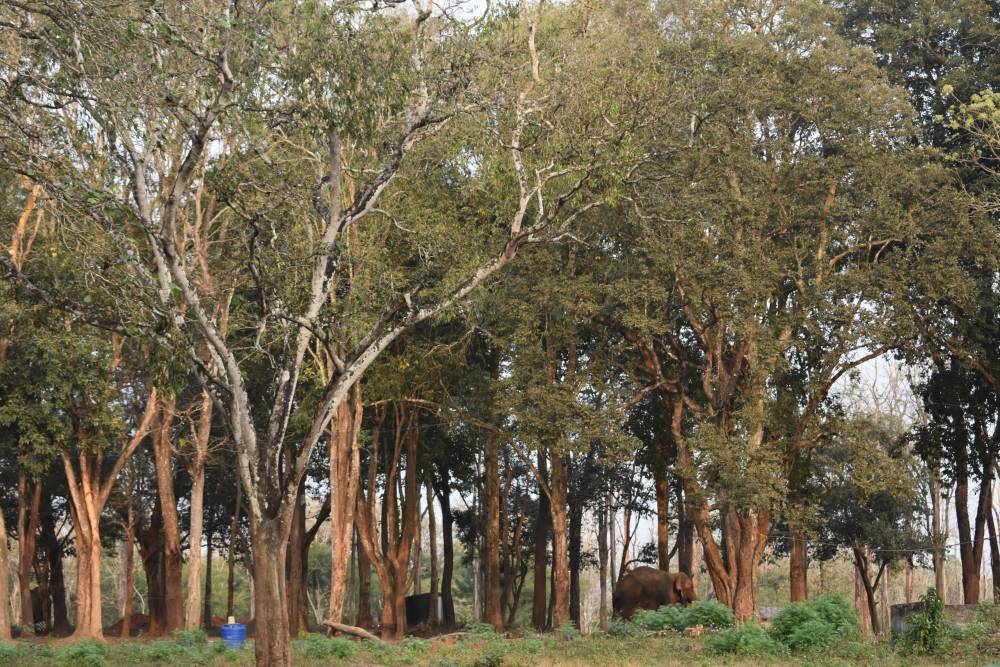
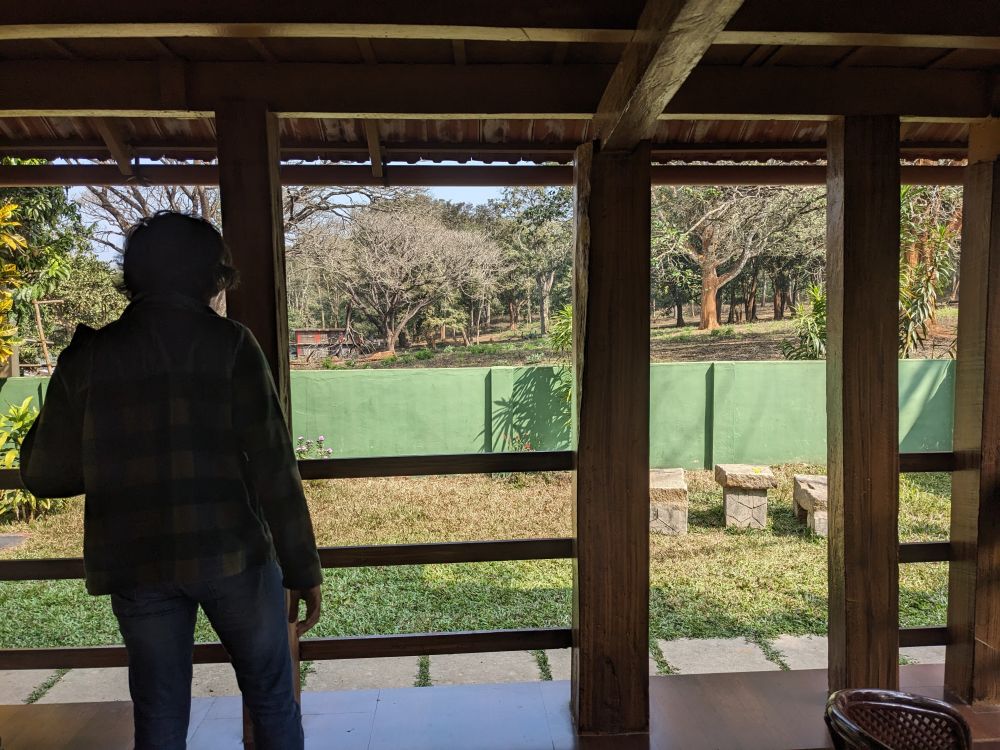
As I pack and put my stuff in my car, the elephants in the camp trumpet. I take a deep breath. I can come to this sanctuary and this cabin next to the elephants again.
Do you know what you hear and feel surrounded by miles and miles of jungle?
You hear silence.
You feel a lot of things.
Gratitude, true happiness, and the joy of one’s own and nature’s company are only some of those feelings.
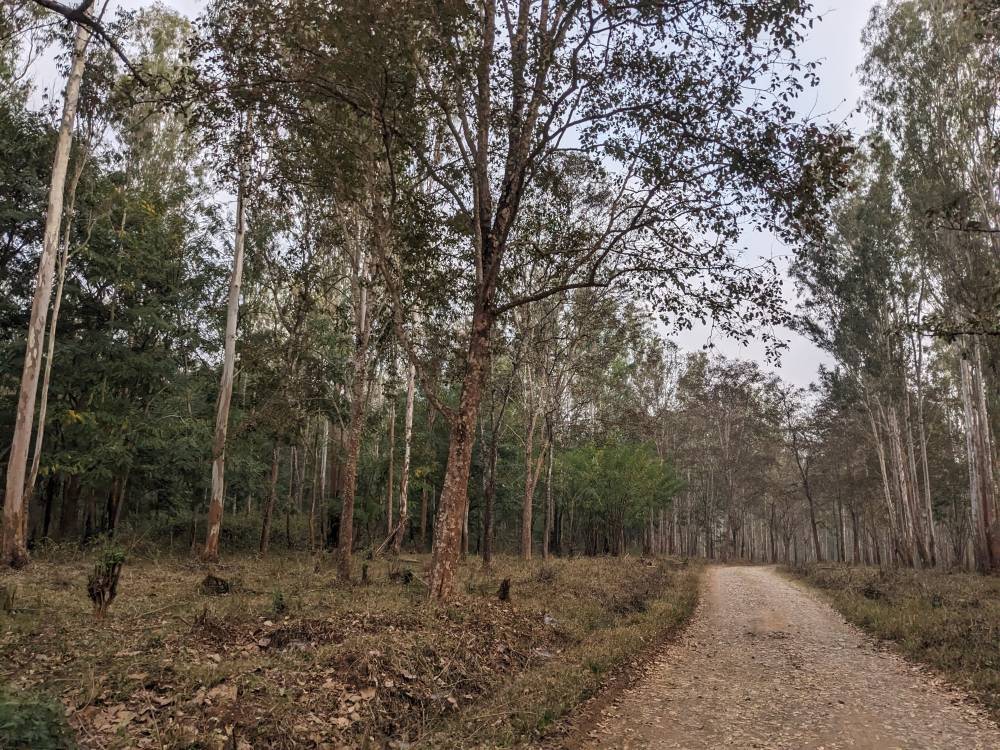
Does nature stirs you alive too?
*****
My much-awaited travel memoir
Journeys Beyond and Within…
is here!
In my usual self-deprecating, vivid narrative style (that you love so much, ahem), I have put out my most unusual and challenging adventures. Embarrassingly honest, witty, and introspective, the book will entertain you if not also inspire you to travel, rediscover home, and leap over the boundaries.
Grab your copy now!
Ebook, paperback, and hardcase available on Amazon worldwide. Make some ice tea and get reading 🙂
*****
*****
Want similar inspiration and ideas in your inbox? Subscribe to my free weekly newsletter "Looking Inwards"!

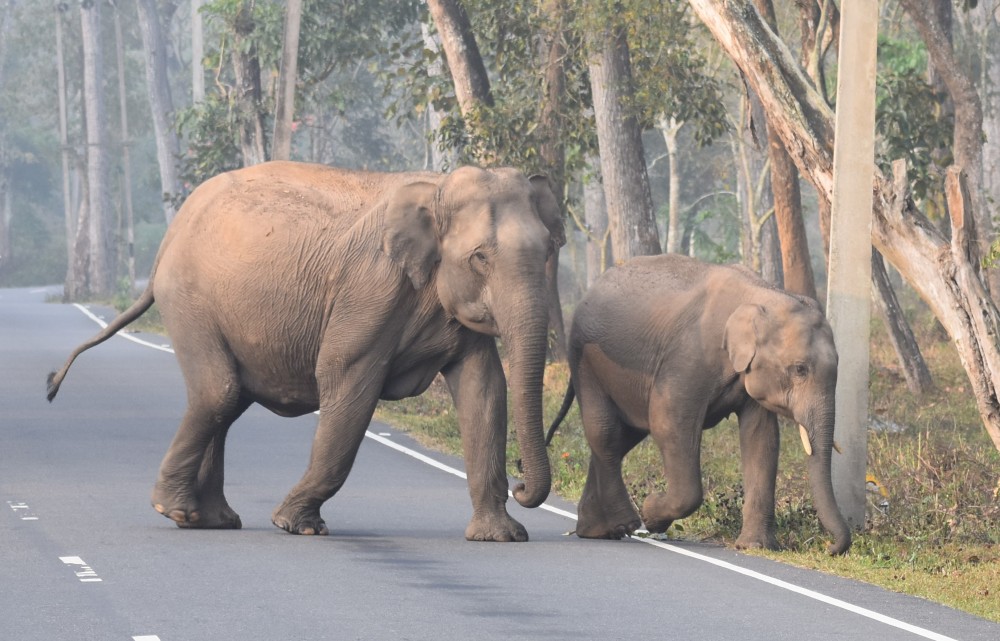
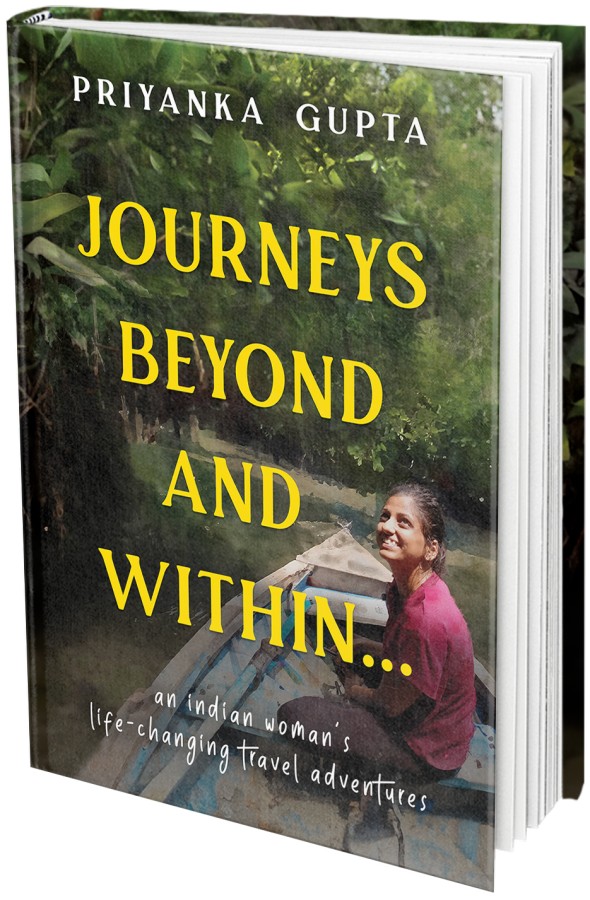
Beautiful pictures! It looks like my dream! Would love to go there some day!
Thanks, Sarah. I hope you do get to visit some day.